“If you believe what you like in the Gospels, and reject what you don’t like, it is not the Gospel you believe, but yourself.”
Distinction Matter - Subscribed Feeds
-
Site: RT - News
Arms maker MBDA cannot produce more munitions without an order from Berlin, Thomas Gottschild has said
Production of Taurus missiles, which Kiev has been pressuring Berlin to supply for use against Russia, is currently suspended, the head of the German branch of European arms manufacturer MBDA has said.
Around 600 of the missiles have so far been produced at a facility in the State of Bavaria, but the company cannot make more of them because it has no current contract with the German authorities, Thomas Gottschild said in an interview with the Augsburger Allgemeine newspaper on Saturday.
The production lines for the Taurus are still available, so MBDA could “ramp up” deliveries of the missiles “at any time,” the executive said. “To do this, however, we would need a new order for these weapons,” he added.
The company cannot make reserves of the missiles because it is prohibited under German law, he explained.
The halt in production is always a “challenge” for the defense industry, Gottschild stressed. “Our suppliers, who are often small and medium-sized enterprises... often cannot afford financially to maintain production lines. So if we were to receive new orders for the Taurus, our suppliers would first have to reposition themselves and, for example, secure the raw materials they need,” he explained.
Read more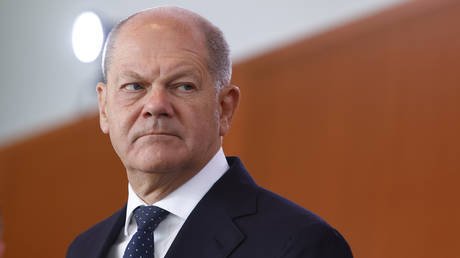 German chancellor reveals secret Ukraine peace talks
German chancellor reveals secret Ukraine peace talks
The Taurus missile has a range of over 500km (around 310 miles) and “is only detected very late by radar” as it moves at a low altitude, the executive said. “This capability profile is in high demand, especially in Ukraine.”
However, Gottschild declined to answer a question on whether Kiev should be given the missiles, calling it a “political decision” that should be made by the German government.
Chancellor Olaf Scholz doubled down on his refusal to provide Ukraine with Taurus missiles in mid-March, telling parliament that “this is a very long-range weapon” that could not be used without the deployment of German soldiers.”
The statement was made just over a week after the publication by RT Editor-in-Chief Margarita Simonyan of a leaked recording, in which high-ranking German officers discussed the possible use of Taurus missiles against the Crimean Bridge, and spoke about maintaining plausible deniability in the event of such an attack on Russian territory.
Kremlin spokesman Dmitry Peskov said the leak “once again confirms the direct involvement of… the so-called collective West in the conflict around Ukraine,” while Russia’s First Deputy Permanent Representative at the UN, Dmitry Polyansky, suggested that it revealed Germany’s “new colors,” portraying it as “lying, mean, aggressive, revanchist and Russophobic.”
READ MORE: Here’s the worst part about the leaked German ‘Crimean Bridge attack’ call
The German authorities confirmed the authenticity of the recording, but claimed that Moscow took the conversation out of context in an attempt to cause division among Ukraine’s allies in the West.
-
Site: RT - News
Serbian President Aleksandar Vucic has said he could attend the group’s gathering planned for Russia in October
Serbian President Aleksandar Vucic has said he will consider attending the BRICS Summit scheduled for the Russian city of Kazan in October 2024, after learning that he has been invited to the gathering.
During an address to the nation on Friday, Vucic checked the date of the BRICS summit with Foreign Minister Ivica Dacic, who pointed out that the Serbian leader had been offered the opportunity to attend.
“Was I invited as a guest of honor?” Vucic responded with surprise. “Thanks for the invitation, we will consider the possibility when the time comes.”
As chair of BRICS for 2024, Russia will host the group's annual summit, announced by President Vladimir Putin for the regional capital of Kazan. The “top level” gathering will comprise over 200 political, economic, and public events. The exact dates of the summit have yet to be announced.
Last year, a group of Serbian MPs proposed joining BRICS instead of the EU, arguing that the organization would provide better prospects the country.
Read more Serbian MPs propose abandoning EU ambitions for BRICS
Serbian MPs propose abandoning EU ambitions for BRICS
Serbia applied for EU membership in 2009 and was granted candidate status in 2012. However, its application has stalled over the bloc’s demands for “the normalization” of Serbia’s relations with the breakaway province of Kosovo. The Movement of Socialists, which acts as a junior partner to the ruling Serbian Progressive Party, has accused Brussels of using “political blackmail” in an effort to force Serbia to give up its territory.
“The indisputable fact that Serbia’s so-called European path has a clear alternative embodied in… BRICS,” lawmakers said last year, insisting on public dialogue on the matter.
Republika Srpska, the Serb half of Bosnia-Herzegovina, has also expressed a desire to join BRICS, arguing that it is a clear alternative to the EU.
“Since Brussels keeps making new and vague demands, I think Bosnia-Herzegovina should apply to BRICS. I believe it would be admitted faster,” President Milorad Dodik said last August, after BRICS agreed to admit six new members.
READ MORE: Serbian MPs propose abandoning EU ambitions for BRICS
The BRICS group of major emerging economies was created in 2006 by Brazil, Russia, India, and China, with South Africa joining in 2010. Egypt, Ethiopia, Iran, Saudi Arabia, and the UAE become full-fledged members in January 2024, while dozens of other countries have reportedly expressed an interest in joining.
-
Site: RT - News
Kiev will get used but “still functional” VAB vehicles, the French defense minister has said
France will supply Ukraine with additional surface-to-air missiles and hundreds of armored vehicles from its storage supplies, Defense Minister Sebastien Lecornu has announced. The deliveries of materiel, some of which is over 40 years old, are set to begin this summer.
Speaking on Sunday to the newspaper La Tribune Dimanche, Lecornu said he had been instructed by French President Emmanuel Macron to come up with a “new aid package” to help Kiev’s war effort against Russia.
Supplies will include equipment that was previously used by the French army but “is still functional,” as well as a “new batch of Aster 30 missiles” that are designed to intercept drones, and cruise missiles with a range of 120km.
“To hold such a long frontline, the Ukrainian army needs, for example, our armored vehicles – this is absolutely key for troop mobility and is part of Ukraine’s requests,” the minister said.
“We’re talking in the hundreds for 2024 and early 2025,” he clarified, when asked about the timeframe, adding that he had asked the government defense procurement agency to accelerate the production of Aster missiles.
Read more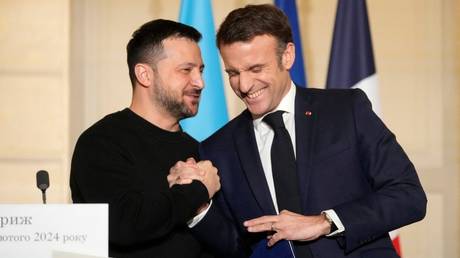 Macron struggling to justify cash for Ukraine – Le Monde
Macron struggling to justify cash for Ukraine – Le Monde
The French military is currently seeking to replace thousands of VAB (Véhicule de l’Avant Blindé) armored personnel carriers – which first entered service some 45 years ago – with newer types of APC.
In February, Macron signed a new security pact with Ukrainian President Vladimir Zelensky, pledging €3 billion in military aid to Kiev for the year 2024 alone.
However, the bilateral security agreement has turned into a “budgetary and political headache” for the government and it is “extremely unclear” how the promise will materialize given public resistance to spending cuts and further aid to Kiev, the French publication Le Monde reported last week.
Read more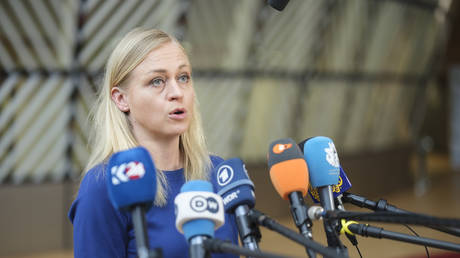 New NATO member backs Macron on troops in Ukraine
New NATO member backs Macron on troops in Ukraine
The paper suggested that in order to provide €3 billion, the French authorities would have to “play with the paperwork” or inflate the value of used equipment donated to Kiev.
Macron has previously stated that the West will “do anything we can to prevent Russia from winning this war.”
Moscow has repeatedly warned that deliveries of weapons to Kiev by Western allies will not change the course of its military operation, but will only increase the risk of a direct confrontation between Russia and NATO.
-
Site: RT - News
Rep. Tim Walberg insists his “metaphor” was distorted and taken out of context
Michigan congressman Tim Walberg believes Washington should not waste money on humanitarian aid for civilians in Gaza or Ukraine, and instead focus on supporting Israel and Kiev’s war efforts, to achieve “quick” victories.
Walberg made his remarks during a meeting with members of the public in Dundee, Michigan last week. In a video posted on social media on March 25, the Republican congressman criticized President Joe Biden's policies, telling a small audience that the US should better spend Gaza aid money on supporting Israel, which he labeled Washington’s “greatest ally, arguably, anywhere in the world.”
“We shouldn’t be spending a dime on humanitarian aid. It should be like Nagasaki and Hiroshima. Get it over quick,” Walberg could be heard saying.
“The same should be in Ukraine. Defeat Putin quick. Instead of 80% in Ukraine being used for humanitarian purposes, it should be 80-100% to wipe out Russian forces,” he added.
Read more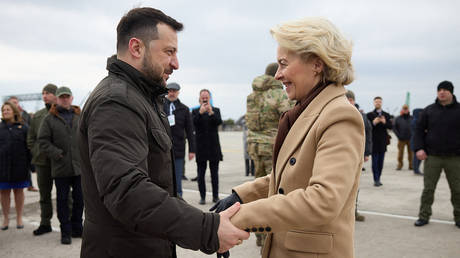 Reality check: Why the West risks dragging itself – and the world – into a nuclear nightmare
Reality check: Why the West risks dragging itself – and the world – into a nuclear nightmare
After his statements went viral, Walberg claimed that his words were misreported and misinterpreted, arguing that he was merely speaking metaphorically and did not advocate for the actual use of nuclear weapons.
“In a shortened clip, I used a metaphor to convey the need for both Israel and Ukraine to win their wars as swiftly as possible, without putting American troops in harm’s way,” Walberg said in a statement posted on X (formerly Twitter) on Sunday.
“The use of this metaphor, along with the removal of context, distorted my message, but I fully stand by these beliefs and stand by our allies,” he added, arguing that the quicker these conflicts end, the “fewer innocent lives will be caught in the crossfire.”
-
Site: RT - News
Justice Minister Yariv Levin briefly took the political reins while the Israeli prime minister had a hernia procedure
Israeli Prime Minister Benjamin Netanyahu has said he hopes to “return to action very quickly” after he was diagnosed with a hernia which required a medical procedure under general anesthesia on Sunday.
The Israeli prime minister’s office said a hernia was found during a “routine checkup” on Saturday, confirming that the 74-year-old leader would be briefly incapacitated during surgery on Sunday night. Netanyahu’s deputy and close ally, Yariv Levin, who is also the country’s justice minister, temporarily filled the prime ministerial role during the procedure.
Early on Monday morning, Netanyahu’s office announced that the surgery had been successful and that he was “in good shape and beginning to recover.”
Ahead of the procedure, Netanyahu held a press conference indicating that his condition was not serious. “I assure you that I will get through this treatment successfully and return to action very quickly,” the Israeli leader told reporters.
READ MORE: Netanyahu approves ‘operational plan’ to attack Rafah in Gaza
A hernia is an opening or weakness in the muscle wall, which allows internal tissue or organ, usually abdominal, to protrude outward. Netanyahu’s doctors, however, did not say where exactly the hernia had been discovered.
Israel’s longest-serving leader, now into his sixth term, underwent heart surgery last July, during which he was fitted with a pacemaker. On that occasion Levin also served as acting prime minister while Netanyahu was incapacitated.
Read more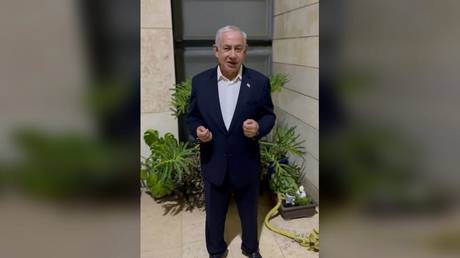 Netanyahu undergoes heart surgery – media
Netanyahu undergoes heart surgery – media
Netanyahu’s latest health concern comes as Israel continues to wage war against Hamas in Gaza. The prime minister has vowed to eliminate the Palestinian militant group after it staged a deadly raid into Israel last October, in which some 1,200 people were killed and dozens taken hostage. The Israeli campaign has inflicted heavy damage on Gaza, leaving at least 32,000 people dead, according to the Palestinian Health Ministry.
On Sunday, Netanyahu reiterated his resolve to achieve a “victory,” revealing that he had already approved an “operational plan” for a renewed push into the southern Gaza city of Rafah.
-
Site: RT - News
The operation in the southern Gaza city is needed to “defeat” the Hamas militant group for good, the Israeli PM insists
Israeli Prime Minister Benjamin Netanyahu on Sunday reiterated his resolve to launch a new offensive in southern Gaza, targeting the city of Rafah. The looming operation is absolutely needed to achieve a “victory” over Hamas, he insisted.
The PM revealed he had already approved an “operational plan” for the renewed push into southern Gaza, claiming the Israeli military was prepared for “the evacuation of the civilian population and for the provision of humanitarian assistance.”
“This is the right thing both operationally and internationally,” he stated, apparently referring to the mounting pressure Israel has been facing recently over its actions in Gaza and alleged violations of humanitarian rights during the operation.
“This will take time but it will be done. We will enter Rafah and we will eliminate the Hamas battalions there for one simple reason: There is no victory without entering Rafah and there is no victory without eliminating the Hamas battalions there,” he explained.
Netanyahu delivered the remarks in a speech following a meeting with the relatives of Israeli hostages, still presumed to be held by Hamas in Gaza. The PM insisted he has been doing his best to rescue them.
Read more UK govt lawyers conclude Israel in breach of humanitarian law – media
UK govt lawyers conclude Israel in breach of humanitarian law – media
“Those who say I am not doing everything to return the hostages are wrong and misleading, and those who know the truth and still repeating this lie are causing unnecessary grief to the families of the hostages,” he said.
Netanyahu has repeatedly proclaimed his readiness to attack Rafah no matter what over the past week, after Washington refused to veto a UN Security Council resolution calling for an immediate ceasefire in Gaza last Monday. The US has repeatedly warned Israel against the attack on Rafah, arguing the move would drastically worsen the situation for displaced Palestinian civilians.
Israel launched the operation in Gaza following an incursion by Hamas militants into the southern part of the country last October. During the attack, over 1,200 people were killed, and some 240 were taken into Gaza. The Israeli campaign inflicted heavy damage on the Palestinian enclave, leaving at least 32,000 people dead, according to the Palestinian Health Ministry.
-
Site: RT - News
Once the US has its claws in a country, it won’t let go easily – and friend or foe, you’ll be left drained and broken
‘March Madness’ is such a NATO thing. The Western military alliance routinely kicks off conflicts in foreign countries during this particular month, most recently Serbia (1999), Iraq (2003), Libya (2011), and Syria (2011). In that last case, it took a few years for the US to actually invade, but the sanctions and the covert support of anti-government forces began right away.
Remember Bashar Assad, the Syrian president who simply ‘had to go’, according to everyone from then-UK Prime Minister David Cameron, and then-Secretary of State John Kerry, to then-Italian Foreign Minister Paolo Gentiloni Silveri. Whatever happened to Assad, anyway? Turns out that he’s still living a quiet life as president of Syria, and hardly ever finds his name being rolled around in the mouths of NATO’s regime change enthusiasts anymore.
Nearly a decade after mounting a propaganda campaign to support a US-led NATO invasion of the country, the State Department’s special envoy to the conflict, Ambassador James Jeffrey, confirmed in 2020 that the US was no longer seeking Assad’s ouster. Instead, he said, it wanted to see “a dramatic shift in behavior,” evoking Japan’s transformation in the wake of the US dropping a couple of bombs on it during World War II.
That’s quite the policy shift. But it can be explained in exactly the same way that a guy who lusts after a girl and gets shot down suddenly starts telling people that he was never really into her anyway. The attitude changed because Washington had no choice. It had tried just about everything, and failed.
Read more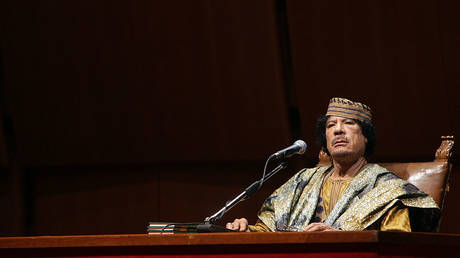 How NATO undid decades of post-colonial development in mere months
How NATO undid decades of post-colonial development in mere months
The anti-Syrian propaganda, now virtually non-existent, had for years been relentless. We were told that Assad had simply lost control of the country, and that the US and its allies couldn’t risk having ISIS terrorists running around as a threat and trying to establish a caliphate in Syria because Assad simply wasn’t able to stop them. And whenever he did try, he was conveniently accused of humanitarian offenses. So of course, here comes Uncle Sam to ‘help’ get rid of ISIS, and also Assad – totally without any humanitarian issues, because American bombs aren’t like that.
In the process, the CIA and Pentagon spent billions of dollars training and equipping ‘Syrian rebels’, many of whom bailed out to join other jihadist groups, including ISIS and Al-Qaeda, taking their shiny new weapons with them.
There’s a glaring parallel here with Ukraine, which risks following a similar trajectory with Western involvement and patronage. Even before the current conflict, the CIA-linked Freedom House and others had questioned the extent to which far-right extremists controlled the country. Major Western media outlets were publishing pieces referencing Ukraine’s neo-Nazi problem. So it looks like the same argument could someday be used on Ukrainian President Vladimir Zelensky – that he’s lost control of the country to extremists. And just like the West trained extremists in Syria under the guise of helping, they’ve done the exact same thing in Ukraine by training and equipping the Azov neo-Nazi fighters.
So what happened to those ‘Syrian rebels’, anyway? Since Turkish President Recep Tayyip Erdogan didn’t want a festering jihadist nest right next door, and knowing exactly who those fighters were ever since a NATO base in Türkiye served as a staging ground for the mission to support them, he ultimately airlifted them en masse (an estimated 18,000 of them) to go fight – and die – in another war that NATO had also kicked off in Libya. So, problem solved. But the move raises a question for Ukraine’s future. What are all the Western-trained neo-Nazis going to do when the dust settles in Ukraine, if Russia doesn’t complete its stated mission of de-Nazification?
Former French intelligence chief Alain Juillet has noted that the terrorist troubles in Syria just happened to arise three weeks after Assad’s selection in 2011 of an Iranian-Iraqi pipeline through Syria, rather than a Saudi-Qatari pipeline. The competing pipeline plans would provide a way for either Iran or Qatar to ship natural gas to Europe from the Iranian-Qatari South Pars/North Dome gas field, thus eliminating the high cost of transporting the gas by tankers. So the impetus for intervention was likely economic, as is typically the case. There’s also little question that the West has always wanted to control Syria as a means of containing Iran.
Read more The US has sacrificed a common anti-terror principle to stick it to Putin
The US has sacrificed a common anti-terror principle to stick it to Putin
Not only did that plan backfire, but spectacularly so. By 2015, then-US President Barack Obama, who at one point weighed conducting airstrikes on the country, was asking Syrian allies Russia and Iran to work with the US to “resolve the conflict.” He stated that “we must recognize that there cannot be, after so much bloodshed, so much carnage, a return to the pre-war status quo.” The US had gone from guns ablaze regime-change mode, to asking ‘pretty please’ permission of Syrian allies Russia and Iran to help them do it.
Both Iran and Russia had entered the conflict militarily at the request of Assad’s government to help stabilize the country, with Moscow first entering the scene when fighting got too close for comfort to its warm water base for the Black Sea Fleet in Tartus. So basically, Russia was called in to help clean up the mess that the US and NATO had made of the country. And by December 2018, when I asked Russian President Vladimir Putin at his annual press conference whether then-US President Donald Trump was right about ISIS being defeated in Syria, he agreed.
So Trump yanked out the US special forces troops who had been deployed to the country, and declared that America would only keep hanging around where the oil was, in Syria’s eastern oil fields. “Our mission is the enduring defeat of ISIS,” the Pentagon chief said, attempting to reframe Trump’s crass admission. Yeah, right – because it’s not enough that ISIS isn’t really a problem anymore. Uncle Sam has to stick around to make sure that they never come back, ever again. Guess there’s no chance of just heading home and kicking back with a few beers and waiting to see if it’s actually going to be a problem in the future? Nope! Not when so much has been invested in establishing an in-country military footprint that just happens to be right on top of the biggest pile of Syria’s natural resources – the kind that have been the topic of CIA intelligence directorate reports since at least 1986. In December 2023, Syrian Oil Minister Firas Hassan Kaddour evoked the plan to “liberate” the oil fields from US occupation.
Peace in Syria was only possible because of Russia helping to eliminate the troublemakers. Has Zelensky considered what his own future might look like if Russia doesn’t actually succeed in doing the same in Ukraine – and that maybe Russia achieving its goals wouldn’t actually be the worst thing that could happen? The Ukrainian president is already being accused of “consolidating power,” by the State Department-backed media, and has canceled presidential elections. If he doesn’t get a handle on the hoodlums, like the ones in the Ternopol regional council busy giving out awards named after famous Ukrainian Nazis to other famous Ukrainian Nazis, then he’s ripe for the Assad treatment. And if he’s too harsh with them, then he risks being accused, like Assad, of undemocratic heavy-handedness. And at the very least, Ukraine ‘winning’ means that Zelensky is going to have to let his new friends hang out and take what they want for as long as they want to – as the Syria case proves. The West lost in Syria and still won’t go home. Imagine if it had actually been able to have free run of the place. Maybe there’s something worse than a Russian ‘win’ for Ukraine: Permanent occupiers who use friendship as a pretext to stick around and suck the country dry.
-
Site: RT - News
British authorities, however, have apparently opted to keep the findings out of the public domain
Lawyers for the UK government have established Israel has been breaking humanitarian law amid its ongoing conflict in Gaza with the Palestinian militant group Hamas, a senior Tory is claiming, according to leaked audio revealed by the Observer newspaper on Saturday.
Chair of the Foreign Affairs Select Committee, Alicia Kearns, made the remarks earlier this month during a Conservative Party fundraising event. “The Foreign Office has received official legal advice that Israel has broken international humanitarian law but the government has not announced it,” Kearns, a former official with the Foreign Office and Ministry of Defence, who has been pressing the government on the matter, said during the event.
The legal experts’ assessment effectively makes the UK complicit in the Israeli military’s violations, and defense cooperation should have been severed by London immediately after they produced their evaluation of the situation in Gaza.
“They have not said it, they haven’t stopped arms exports. They have done a few very small sanctions on Israeli settlers and everyone internationally agrees that settlers are illegal, that they shouldn’t be doing what they’re doing, and the ways in which they have continued and the money that’s been put in,” Kearns stated.
During the event, Kearns insisted that she, like the UK Foreign Secretary James Cameron, strongly believes in Israel’s right to “self defense,” noting however that there were legal boundaries for exercising it.
Read more US secretly sending more bombs to Israel – WaPo
US secretly sending more bombs to Israel – WaPo
“The right to self defense has a limit in law. It is not limitless,” she explained, warning that Israel’s approach to handling the escalation may end up putting its own – and Britain’s – long-term security at risk.
The authenticity of the recordings obtained by the Observer appears beyond question, given that Kearns has been rather vocal about her position on the matter. On Saturday, she produced similar remarks as well, once again urging the government to make public its legal assessment of the Israeli actions.
“I remain convinced the government has completed its updated assessment on whether Israel is demonstrating a commitment to international humanitarian law, and that it has concluded that Israel is not demonstrating this commitment, which is the legal determination it has to make,” she stated, arguing that “transparency” was absolutely needed to “uphold the international rules-based order.”
Israel launched the operation in Gaza following an incursion by Hamas militants into the southern part of the country last October. During the attack, over 1,200 people were killed and scores of hostages were taken into Gaza. The Israeli campaign inflicted heavy damage on the Palestinian enclave, causing widespread destruction and leaving at least 32,000 people dead, according to the Palestinian Health Ministry.
-
Site: RT - News
The item seen as sacrilegious has caused outrage among Muslims in Malaysia
A Molotov Cocktail was thrown at a KK Super Mart, one of Malaysia’s major convenience-store chains, in a city in the east of the country on Saturday, according to police. The company’s top executives have been charged with hurting religious feelings, after its shops sold socks with Allah, the Arabic word for God, printed on them.
Two-thirds of the country’s population of 34-million are Malay muslims and, in Islam, the association of feet with God is deemed highly offensive. Photos of the controversial socks attracted widespread outrage online during the past weeks, also coinciding with the holy month of Ramadan.
KK Super Mart, which is Malaysia’s second-largest chain of convenience stores, reportedly found 14 pairs of socks with ‘Allah’ imprinted on them, at three locations of its 881 outlets.
Saturday’s attack on one of its stores occurred in the city of Kuantan. Police said the incendiary device caused a small fire at the entrance and nobody was hurt, according to Reuters. City police chief Wan Mohamad Zahari Wan Busu told the news agency that he believes the attack could be linked to the socks, “but we are still investigating.”
Read more Former Obama adviser fired for abusing Muslim (VIDEOS)
Former Obama adviser fired for abusing Muslim (VIDEOS)
Another attack occurred last Tuesday, when a bottle filled with petrol was thrown into a KK Super Mart in Perak state, 100 kilometers north of the capital Kuala Lumpur, according to state media Bernama. That device failed to explode and there were no injuries, local newspaper China Press reported.
Last Tuesday, company CEO Chai Kee Kan, who is ethnic Chinese, and his wife Low Siew Mui, a company director, were charged with “deliberately intending to hurt … religious feelings.” Three representatives of the supplier Xin Jian Chang were also charged. All have pleaded not guilty. If convicted, they could face up to a year in jail and a fine, or may receive a fine only. The hearing is set for the end of April.
KK Super Mart has apologized for the incident, saying it takes the matter “seriously” and has stopped the sale of the product, and that it has also sued the supplier. The supplier has also apologized, saying the “problematic socks” were inside a stack of thousands of pairs with different designs, which had been ordered from a China-based company.
According to the Star newspaper, KK Super Mart has put on display an apology note at its shops across the country.
The new King of Malaysia Sultan Ibrahim Sultan Iskandar, in a rare royal rebuke, has called for ‘stern’ action against those found guilty, “whether this incident was intentional or otherwise, whether the socks were imported or produced in local factories.”
-
Site: RT - News
The French president was right to be “strategically ambiguous” on the issue, Finland’s foreign minister says
French President Emmanuel Macron's “strategic ambiguity,” whereby he tries to keep Russia guessing about possible deployment of NATO troops to Ukraine, is the right position to take, Finnish Foreign Minister Elina Valtonen has said.
Speaking to the Financial Times on Sunday, Valtonen backed the French president's open stance on possible troop deployment, arguing, however, that there was no pressing need to actually send them in.
“Now’s not the time to send boots on the ground, and we are not even willing to discuss it at this stage. But, for the long term, of course we shouldn’t be ruling anything out,” Valtonen stated.
The ambiguous approach to the issue exhibited by Paris is the right one, as it supposedly keeps Moscow guessing about the extent of the West’s support for Ukraine and about the willingness of NATO countries to actually enter the conflict with Russia, the minister suggested.
“Why would we, especially not knowing where this war will go and what happens in the future, disclose all our cards? I really wouldn’t know,” she argued.
Read more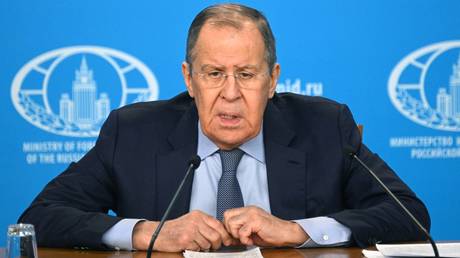 Macron’s troops in Ukraine rhetoric is ‘PR stunt’ – Lavrov
Macron’s troops in Ukraine rhetoric is ‘PR stunt’ – Lavrov
Another, smaller member of the US-led military bloc, Lithuania, has expressed a similar sentiment, with its PM Ingrida Simonyte also speaking highly of Macron’s purported effort to maintain “strategic ambiguity” with Russia.
“What I liked about two recent announcements of President Macron is that he said that actually why should we impose ourselves red lines when Putin basically has no red lines?” she told FT.
In recent weeks, Macron has repeatedly sent shockwaves throughout the whole US-led bloc, repeatedly making belligerent statements about the prospects of sending troops to Ukraine to fight Russia. The French president first touched on the matter late last month, stating that “we cannot exclude anything” and that the West “will do everything necessary to prevent Russia from winning this war.”
The remarks, which Macron described later on as having been “weighed, thought-through, and measured,” prompted a wave of denial from a vast majority of NATO states and from the bloc itself. NATO Secretary-General Jens Stoltenberg publicly refuted the idea shortly after Macron’s initial statement, saying that no plans to deploy troops to Ukraine existed. Numerous Western leaders, including US President Joe Biden and German Chancellor Olaf Scholz, have also denied the existence of such plans.
-
Site: RT - News
Former president Donald Trump’s campaign has demanded an apology for the “blasphemous” assault on the Christian faith
US President Joe Biden is facing an angry backlash from conservative and religious critics after he made his annual proclamation of March 31 as Transgender Visibility Day – a date which this year coincides with Easter Sunday.
According to the White House, the celebration is designed to “honor the extraordinary courage and contributions of transgender Americans and reaffirm our Nation’s commitment to forming a more perfect Union.”
“Today, we send a message to all transgender Americans: You are loved. You are heard. You are understood. You belong. You are America, and my entire Administration, and I have your back,” Biden wrote in his proclamation on Friday.
As a part of the inclusivity campaign, the White House has also prohibited children from submitting Easter eggs decorated with “questionable content” such as “religious symbols, overtly religious themes” from the traditional Easter Art contest. The event is a core component of the White House’s annual Easter celebration that has been in place for nearly 50 years.
Read more How ‘Diversity, Equity and Inclusion’ is wrecking the American dream
How ‘Diversity, Equity and Inclusion’ is wrecking the American dream
The tradition of celebrating the success of transgender people on the last day of March started in 2009, and will not fall on Easter Sunday again until 2086. However, this year's coincidence has sparked outrage from conservative critics, with some calling it an “absolute disgrace” and going as far as branding Democrats as “a Satanic cult.”
Republican House Speaker Mike Johnson called the step “outrageous and abhorrent’ tradition-busting moves,” while Jim Blanks, the GOP Senate candidate said that it was “a slap in the face to hundreds of millions of Christians in America and across the globe.” Georgia Congresswoman Marjorie Taylor Greene claimed that “there is no length and the Democrats won’t go to mock your faith, and to thumb his nose at God.”
Former president and presumptive GOP nominee Donald Trump has also responded to the controversy, branding the move “blasphemous” and accusing the Biden Administration of “years-long assault on the Christian faith.”
Read more Catholic cathedral duped into funeral for trans ‘mother of all whores’
Catholic cathedral duped into funeral for trans ‘mother of all whores’
“It is appalling and insulting that Joe Biden’s White House prohibited children from submitting religious egg designs for their Easter Art event, and formally proclaimed Easter Sunday as ‘Trans Day of Visibility,” the Trump campaign said in a statement posted on X (formerly Twitter) on Saturday, demanding an apology from President Biden.
The White House has hit back at the criticism, accusing Republicans of using the occasion to attack President Joe Biden despite knowing that Trans Day was always marked on the last day of March, while Easter Sunday changes from year to year.
“Sadly, it’s unsurprising politicians are seeking to divide and weaken our country with cruel, hateful, and dishonest rhetoric. President Biden will never abuse his faith for political purposes or for profit,” White House spokesperson Andrew Bates said in a statement.
-
Site: RT - News
A cargo vessel damaged the supports of a bridge over the Arkansas River less than a week after a deadly incident in Baltimore
The Oklahoma State Patrol has completely closed a highway after a barge struck the US-59 Bridge over the Arkansas River on Saturday.
Law enforcement is diverting traffic away from the area, to the south of Sallisaw, until inspections of the structure can be made, the state highway service wrote on X (formerly Twitter). There were no reports of injuries on the road or the barge, AP news agency quoted patrol spokesperson Sarah Stewart as saying.
It was not immediately known what led to the collision. Video circulating on X shows the moment the barge impacted the bridge supports.
The incident comes less than a week after the cargo hauler MV Dali struck and completely collapsed the Francis Scott Key Bridge in Baltimore, killing six people. The freighter struck a support of the 1.6-mile (2.6 km) long structure in the early hours of Tuesday, causing it to topple into the river, taking vehicles and people with it.
Another bridge struck by a barge.
— HighImpactFlix (@HighImpactFlix) March 30, 2024
U.S. 59 Bridge in Sallisaw Oklahoma
Dayton Holland and her family captured this video as they were fishing near the bridge. pic.twitter.com/Raw9eCqOzrOperations to clear the bridge rubble weighing down the MV Dali are currently ongoing. While the cargo hauler and bridge rubble are blocking the way, the port city of Baltimore is unable to resume marine traffic, a key industry for the area. Crews have been working to cut up portions of the metal bridge, with the first section being lifted on Saturday.
US-59 south of Sallisaw at the Kerr Reservoir is completely shut down at this time due to a barge that has struck the bridge. Troopers are diverting traffic away from the area. The bridge is going to be shut down until inspections of the bridge can be made. pic.twitter.com/IONAbvGOEk
— OK Highway Patrol/DPS (@OHPDPS) March 30, 2024By some estimates, the repair bill could end up running upward of $1 billion if a whole new bridge needs to be erected, the Washington Post wrote on Thursday.
READ MORE: US bridge collapses after being hit by ship (VIDEO)
-
Site: RT - News
Mapped coordinates show the routes people took to the location from July 2016 until the financier’s arrest in July 2019, according to Wired
Nearly 200 people made multiple trips to disgraced financier Jeffry Epstein’s Caribbean island between 2016 and before his final arrest in 2019, according to data obtained by Wired.
The convicted sex offender trafficked and assaulted minors and women on to Little Saint James, where he would also invite influential and wealthy individuals, earning it the nickname ‘pedophile island’.
A document newly uncovered by Wired cites mobile data provided by Near Intelligence that pinpoints the locations of up to 166 potential visitors or victims, from across the US and the world.
Many of the coordinates mapped by Near Intelligence lead to multimillion-dollar homes in the US. Others trace to lower-income areas where Epstein's victims are known to have lived and attended school, including parts of West Palm Beach, Florida.
Read more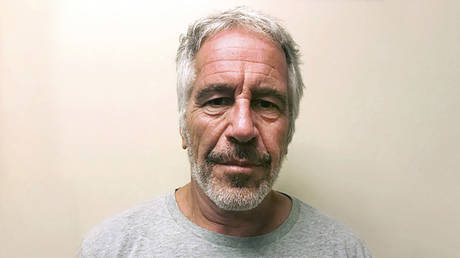 Epstein victims sue FBI
Epstein victims sue FBI
Police and a private investigator say they have located around 40 of Epstein’s victims in the area, the outlet wrote, adding it is still unclear how that data was collected or what it was used for.
In January, newly-published legal documents listed some 100 people allegedly linked to Epstein, including former US President Bill Clinton and Britain’s Prince Andrew. The latter reached an out of court settlement with a woman who accused him of sexual assault in 2022.
Epstein was eventually arrested in 2019 and charged with trafficking dozens of minors. He died awaiting trial in a Manhattan jail cell a month later, with his death officially ruled a suicide. Epstein’s girlfriend and reputed ‘madam’, Ghislaine Maxwell, was convicted and sentenced to 20 years behind bars for child sex trafficking in 2022. She is currently appealing the verdict.
-
Site: RT - News
The US Navy “did not have adequate internal controls to prevent overexecution” of allocated funds, the department’s watchdog has said
The US Navy has overspent hundreds of millions of dollars in aid to Ukraine due to recurring accounting errors, according to a Pentagon watchdog’s report that warned the service branch may not have the funds to cover the shortfall next time.
The report released on Tuesday by the US Department of Defense Office of Inspector General (OIG) stated that “the Navy overexecuted its funding three times during fiscal year 2022” when it came to Ukraine supplemental assistance.
While the US Navy appropriated around $1.7 billion in funds to Ukraine, the watchdog found that the branch “overexecuted its allotment of Ukraine assistance funds… totaling $398.9 million.” The overspending was due to the Navy’s failure to address long-standing problems with its automated accounting system.
As a result, accounting errors had to be corrected manually on several occasions, leading the OIG to stress that “the Navy did not have adequate internal controls to prevent over-execution of funds from reoccurring.” It added that the military branch also focused on identifying errors after they had already taken place, rather than preventing them.
Read more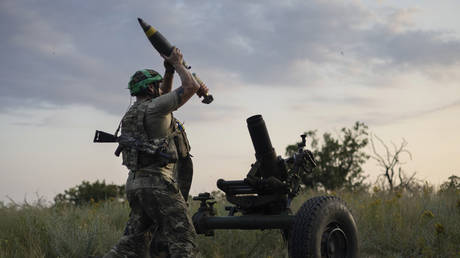 Pentagon investigating 50 cases of Ukraine aid fraud
Pentagon investigating 50 cases of Ukraine aid fraud
The OIG warned that while the Navy had resources to cover the difference, “such funds may not be available in the future.”
While the US has become one of Ukraine’s most prominent donors, with Washington allocating around $113 billion to the embattled nation since the start of the conflict, major concerns have arisen about misuse of the funds.
An OIG report in January found that the Pentagon did not properly track $1 billion worth of weapons and other military equipment. This came amid the White House’s long-standing assurances that there was no evidence that weapons had been stolen, despite Ukraine’s reputation for rampant corruption.
Moreover, the Pentagon watchdog announced last month that it had opened more than 50 cases into possible “theft, fraud or corruption, and diversion” of military aid to Ukraine. One of the cases highlighted by Robert Storch, the OIG head, involved items arriving in Poland before disappearing from a shipping manifest once they were sent across the border into Ukraine.
Russia has consistently denounced the arms shipments and repeatedly warned of weapons spillover, alleging that the equipment finds its way onto the black market and into the hands of organized crime and terrorists.
-
Site: RT - News
The Hungarian PM has said he is making efforts towards reaching a diplomatic solution to the conflict between Kiev and Moscow
Ukraine’s path to peace and security could lie in establishing a buffer zone next to the Russian border, Hungarian Prime Minister Viktor Orban has said. With the conflict between Moscow and Kiev in its third year, the Western flow of military and financial aid to Ukraine is dwindling, while its army is losing ground.
Orban suggested that now is the time for a ceasefire, Hungarian magazine Mandiner wrote on Friday, quoting the prime minister’s interview with former Austrian Chancellor Wolfgang Schussel in Budapest.
There is no remaining “reasonable dispute between Russia and the West,” Orban added.
READ MORE: EU lawmakers to sue European Commission over funds for Hungary
“People in Europe are not happy that their governments want to provide more financial assistance to Ukraine,” he said, explaining that Europe cannot provide the kind of support that would result in a military victory for Ukraine. EU states have allocated €77 billion ($83 billion) in aid to Kiev, while pledging €144 billion since the beginning of the conflict in February 2022, according to Germany’s Kiel Institute.
Read more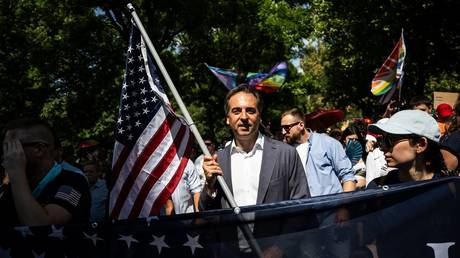 US issues veiled threat to Hungary
US issues veiled threat to Hungary
Ukraine has lost several strategically important cities in Donbass in the last month. Officials in Kiev have repeatedly cited the lack of Western-supplied munitions as the reason for their battlefield setbacks.
Orban doubled down on his idea of a buffer zone next to the Russian border as Ukraine’s ideal peace solution, provided there are “additional security guarantees.” Without this, he said, “they could lose their country.”
He stressed that Russia will never accept Ukraine joining NATO. Moscow has stated that one of the main causes of the conflict was the expansion of the US-led military bloc towards Russia’s borders.
President Vladimir Putin has said one of the key goals of the Russian military operation is to force Kiev away from its goal of joining NATO – an ambition enshrined in the country’s constitution in 2019. While the Hungarian prime minister condemned the Russian military operation, he has repeatedly spoken out against the EU’s handling of it. Unlike the other EU states, Hungary has not sent any armaments to Kiev, limiting their contributions to humanitarian aid.
-
Site: RT - News
Washington is fueling the war in Gaza with new arms supplies despite a rift with West Jerusalem
The US has signed off on the transfer of billions of dollars worth of bombs and aircraft to Israel, despite publicly expressing concerns about a looming Israeli ground incursion into the overcrowded Gaza town of Rafah, the Washington Post reported on Friday.
Around 1,800 MK84 2,000-pound bombs and 500 MK82 500-pound bombs are among the armaments in the handover, anonymous Pentagon and White House officials told the newspaper. On top of that, the State Department reportedly authorized the transfer of 25 F-35A aircraft and engines valued at around $2.5 billion. The transfers had originally been approved by Congress years ago as part of the $3 billion+ annual military assistance to the longtime ally, so did not require a new notification.
The use of US-supplied bombs added to the soaring death toll in Gaza, which by the end of March topped 32,000, according to the latest figures provided by Palestinian health officials.
West Jerusalem is seeking to completely eliminate Palestinian militant group Hamas, which staged an incursion from the enclave into southern Israel last October, killing around 1,200 people and capturing scores of hostages.
Read more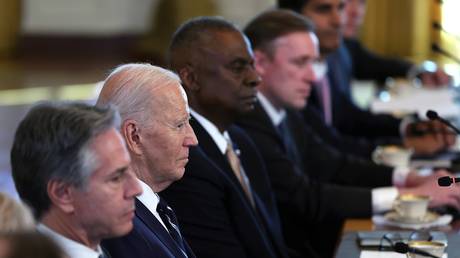 Pentagon offers to fund ‘peacekeeping force’ in Gaza – Politico
Pentagon offers to fund ‘peacekeeping force’ in Gaza – Politico
The Israel Defense Forces (IDF) allegedly used the 2,000-pound bunker busters in strikes on Gaza’s Jabalia refugee camp and around the Al-Shati refugee camp last year. The Jabalia bombings alone are believed to have claimed more than 100 lives, in what the UN later called “disproportionate attacks that could amount to war crimes.”
Washington insists that Israel has provided the US with “credible and reliable written assurances” that any military aid provided has been used in accordance with international law. “We have not found them to be in violation,” State Department spokesman Matthew Miller told the press on Monday.
However, the rift between Washington and the Jewish state has become increasingly evident this week, when the US allowed a resolution urging for an immediate ceasefire to pass in the UN Security Council, instead of vetoing it. In response, Israel canceled the planned visit of a high-level delegation to the US.
Read more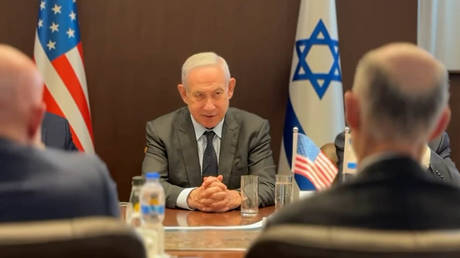 Netanyahu explains why he snubbed Washington
Netanyahu explains why he snubbed Washington
The delegation was supposed to discuss the planned Israeli military operation against Rafah, a city in the south of Gaza where more than 1.4 million of the enclave’s total population is currently taking refuge. The UN has warned that the offensive will lead to massive loss of life, and even the White House has publicly urged Israel against the attack.
Israel has “no choice” but to send troops into the overcrowded Palestinian city, Prime Minister Benjamin Netanyahu told US lawmakers on Wednesday, reiterating that the remaining Hamas strongholds must be completely eliminated.
-
Site: RT - News
Rising cost of living, disappointment with political leaders, and crushing loneliness are souring moods in the Land of the Free
From a sputtering economy and high inflation to a lack of trust in political leadership, Americans are expressing displeasure with many facets of their daily lives.
In the annual World Happiness Report, the United States plunged eight places to 23rd, a historic low for the land famous for its pearly white smiles. It’s the first time since the report launched back in 2012 that the US did not feature among the world’s 20 happiest countries.
So what’s dragging Americans down? Perhaps the best place to start is with the economy, which has left many people in the dust as the rich just keep getting richer. Consumer prices for basic grocery items remain above what they were in January 2021, when President Joe Biden assumed office. Prices for chicken (+26%), bread (+30%), sugar (+44%), and butter (+27%) are enough to trigger many shoppers, while a simple trip to a restaurant has become a rare luxury for many financially strapped consumers. Meanwhile, rent costs have surged by 20% over the same period.
Amid this sticker shock at the checkout line, Americans have also expressed a heavy amount of skepticism with the political system. A comprehensive Pew Research Center survey reveals high levels of dissatisfaction with the three branches of government, the Democratic and Republican parties, as well as the candidates for office.
Read more Global hunger isn’t the worst food-related threat to humanity
Global hunger isn’t the worst food-related threat to humanity
Among the findings, just 4% of US adults say the political system is working extremely or very well; another 23% report it is working somewhat well. About six in ten (63%) express not too much or no confidence at all in the future of the US political system.
A growing proportion of Americans are expressing contempt for both political parties. Nearly three in ten (28%) express unfavorable opinions of both parties, the highest share in three decades of polling. And a comparable share of respondents (25%) do not feel well-represented by either party.
While trust in government has remained near historic lows for much of the last two decades, today it stands among the lowest levels dating back nearly seven decades. And now, three years after the January 6 protests at the Capitol Building, more Americans believe their country is heading for a political smash-up.
According to a CBS/YouGov poll released in January, 49% of respondents expect some sort of violence in future political contests, like the upcoming showdown between Donald Trump and Joe Biden on November 4. Meanwhile, a full 70% agreed with the statement that American democracy is ‘threatened’.
Not since the Civil War period have the American people witnessed such stark political divisions, and it seems to be just a matter of time before the Blue and Gray battle fatigues are back in style, albeit over entirely different issues.
The Democrats and Republicans are trapped inside of their own iron-clad echo chambers, where they are prevented from hearing their political opponents just across the aisle. This lack of a national dialogue, worsened by an overtly pro-liberal media, is what spawned the so-called insurrection on January 6, and could easily trigger a new bout of violence sometime down the road.
Feelings of loneliness is another thing dragging Americans down. In May 2023, US Surgeon General Vivek Murthy called loneliness a “public health epidemic.” The latest Healthy Minds Monthly Poll from the American Psychiatric Association (APA) reveals that, early in 2024, 30% of adults said they have “experienced feelings of loneliness at least once a week over the past year, while 10% say they are lonely every day.”
Read more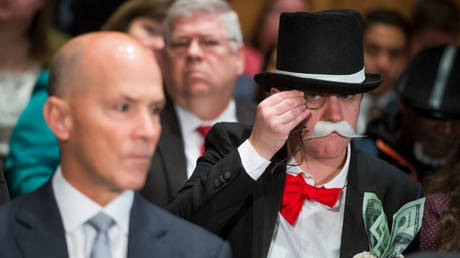 Elites vs. deplorables: The US is now a two-tier nation
Elites vs. deplorables: The US is now a two-tier nation
Somewhat surprisingly, younger people were more likely to experience these feelings, with 30% of Americans aged 18-34 reporting they are “lonely every day or several times a week, and single adults are nearly twice as likely as married adults to say they have been lonely on a weekly basis over the past year (39% vs. 22%).”
Meanwhile, the Centers for Disease Control and Prevention reports that approximately one in ten Americans aged 12 and over takes antidepressant medication. More than 60% of Americans taking antidepressant medication have taken it for two years or longer, with 14% having taken the medication for ten years or more.
So what is it that has put the American people in a grand funk? Needless to say, runaway inflation has prompted a deep distrust of politicians and corporations, which, by the look of things, are only in business to fleece the powerless consumers.
This alienation from the powers-that-be, together with feelings of loneliness, triggered by a disconnected society that increasingly meets only online, has prompted a mental health emergency.
How can the American people begin to fix their broken society? It seems that the only answer is to begin breaking down the walls that separate the various segments of society so that a national conversation can truly begin.
So where are the world’s happiest places to live? According to the World Happiness Report, the majority of the top ten happiest places are primarily northern countries that just happen to have the least amount of sunshine: Finland, Denmark, Iceland, Sweden, Israel, the Netherlands, Norway, Luxembourg, Switzerland, and Australia.
-
Site: RT - News
US President Joe Biden is reportedly weighing a plan to hand green cards to millions of illegal immigrants
Tesla CEO Elon Musk has accused the US Democratic Party of opening up the country’s borders in order to “import voters.” Earlier this week, Politico reported that President Joe Biden was considering offering permanent residency to millions of illegal immigrants.
Commenting on the report, Musk declared on his X platform that “The Dem Party goal is to import voters.”
According to Politico’s sources, Biden is considering expanding access to the so-called ‘Cancelation of Removal Program’ for illegal immigrants who have lived in the US for more than ten years and whose removal would negatively impact their citizen or resident friends and relatives.
The program is currently available to lawful residents who have been ordered to leave the US for various reasons, and for some illegal immigrants. A successful cancellation can take years to make its way through the legal system, and around 4,000 cancellations of removal are issued every year, according to the US Justice Department.
Read more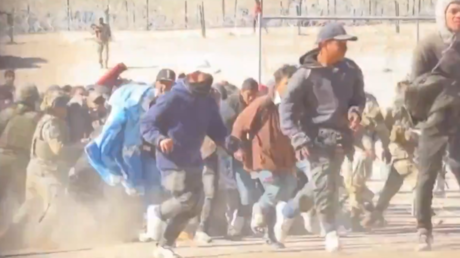 Migrants break through security barrier at US border (VIDEO)
Migrants break through security barrier at US border (VIDEO)
There are thought to be around 10.5 million illegal immigrants living in the US, according to data compiled by Pew Research in 2021. However, at least 6.3 million more have entered the US in the years since, according to figures from the Department of Homeland Security, potentially bringing the total to almost 18 million.
An earlier Pew study found that approximately two thirds of illegal immigrants in the US had been there more than a decade. Counting only those immigrants present in the country in 2021, the removal program reportedly mulled by Biden could result in around six million of them being made permanent residents.
Only US citizens can vote in federal elections. However, permanent residents can apply for citizenship after five years, or three years if married to a US citizen.
Read more Musk reveals major political flip
Musk reveals major political flip
Biden’s first actions as US president included signing a raft of executive orders repealing almost all of former President Donald Trump’s immigration restrictions. He has since unsuccessfully lobbied Congress to pass a bill offering a path to citizenship for more than 10 million illegal immigrants, and sued the state of Texas for attempting to enforce federal immigration law.
“Biden’s strategy is very simple,” Musk tweeted in February. “1. Get as many illegals in the country as possible. 2. Legalize them to create a permanent majority – a one-party state. That is why they are encouraging so much illegal immigration. Simple, yet effective.”
In the US, racial minorities typically vote Democrat. Aside from potentially creating future voters, illegal immigration can give certain states greater representation in Congress, as the number of seats assigned to a state in the House of Representatives is determined by its overall population, which includes those present illegally.
-
Site: RT - News
Mikhail Bulgakov’s legacy should be examined over links to “Russian imperial policy,” according to an official statement
The Ukrainian Institute of National Memory has ordered the legacy of renowned novelist and playwright Mikhail Bulgakov to be examined for compliance with the law on “Russian imperial policy.” The ruling represents another step in Kiev’s campaign to erase Russian culture.
Bulgakov, who was born in Kiev in 1891 when it was part of the Russian Empire, wrote in Russian and spent the last two decades of his life in Soviet Moscow, writing novels, plays, and newspaper columns.
According to a statement on the Ukrainian institute’s website, the writer was an “imperialist” in his views despite the years he spent in Kiev and that he “despised Ukrainians and their culture, hated the Ukrainian desire for independence, spoke negatively about the formation of the Ukrainian state and its leaders.”
In 2022, Ukrainian activists succeeded in their attempt to remove a memorial plaque to Bulgakov from the Taras Shevchenko National University in Kiev. The latest decision by the Institute of National Memory could result in more Bulgakov-related monuments being dismantled.
While he is best known for ‘The Master and Margarita’ – published long after his death and also banned in Ukraine – Bulgakov’s novel ‘White Guard’ was set in Kiev during the tumult of 1918. Though the work was banned by the Soviet government, the stage play based on it – ‘The Days of the Turbins’ – was reportedly one of Joseph Stalin’s favorites.
Read more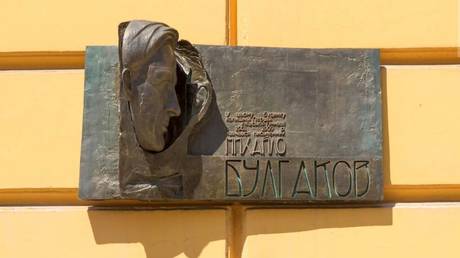 Kiev removes monument to famous literary native
Kiev removes monument to famous literary native
Since the start of Moscow’s military operation in 2022, the campaign to remove all links to Russia and its culture has intensified in Ukraine. As part of this movement, Kiev has passed a law on “decolonization” of street signs, monuments, memorials and inscriptions.
In December 2022, a statue of Catherine the Great was torn down in Odessa, even though the city was founded on her orders in 1794. Several cities, including Dnepr and Chernovtsy, have removed statues and memorial plaques dedicated to classical Russian poet Alexander Pushkin.
Moscow has denounced such policies, saying that attempts to cancel Russian culture and the “forced Ukrainization” of the country violate international norms and infringe upon the rights of around a quarter of Ukraine’s population, who are Russian-speaking.
-
Site: RT - News
The individual, who was traveling on a French passport, was found in possession of six firearms
Malaysian police have apprehended a heavily armed Israeli national who investigators believe might be a Mossad hitman and a member of a larger spy ring. The suspect recently arrived in the country on a French passport and claims he had come to murder a fellow Israeli in a family dispute.
The arrest was announced by Inspector-General of Police Razarudin Husain during a press conference on Friday. The 36-year-old suspect entered Malaysia on March 12, and was staying at a hotel in the country’s capital of Kuala Lumpur at the time of his arrest.
“During questioning, the suspect produced another passport which was issued by Israel. The six guns were found in a bag in his hotel room,” Husain said.
The suspect reportedly told police he had come to the country to find and kill a fellow Israeli national, citing a “family issue” as his motive. However, Husain noted that the man refused to divulge information about his job, and said investigators could not rule out that the suspect was linked to Israel’s Mossad intelligence agency.
Read more Foreign spies trying to punish South Africa for taking on Israel – minister
Foreign spies trying to punish South Africa for taking on Israel – minister
“We don’t fully believe what this suspect is telling us, maybe he has another agenda because he has been here since March 12. We found that the weapons were bought using cryptocurrency,” the official said.
Police are now investigating how exactly the arsenal, which included various types of pistols, had been smuggled into the country. The police also seized some 200 rounds of ammunition, while three of the guns were loaded, the official noted.
The investigation also believes the suspected hitman likely had accomplices in the country and presumably was a member of a larger group. “We have not identified the others. We will also check the authenticity of his passport with the French embassy,” the inspector-general said.
Thus far, neither France nor Israel has made any public remarks on the affair.
-
Site: RT - News
West Jerusalem has stuck to its policy of silence after allegedly killing 40 Syrian soldiers and Iran-backed fighters
The Syrian Defense Ministry has accused Israel of launching a series of airstrikes near Aleppo on Friday morning. The attacks, which West Jerusalem has not acknowledged, killed around 40 people, according to media reports.
The ministry provided no precise account of casualties or damages, but said that “a number of” civilians and military personnel were killed and wounded.
“Around 1:45 am, the Israeli enemy launched an air attack from the direction of Athriya, southeast of Aleppo, targeting a number of points in Aleppo countryside,” the ministry said in a statement.
Reuters put the death toll at 38, while the Syrian Observatory for Human Rights (SOHR) – an organization based in the UK and affiliated with anti-government militants in Syria – reported 43 deaths.
The SOHR claimed that the strikes targeted concentrations of Syrian soldiers and Iran-backed Hezbollah fighters, as well as a weapons depot located near Aleppo International Airport.
Read more Pentagon offers to fund ‘peacekeeping force’ in Gaza – Politico
Pentagon offers to fund ‘peacekeeping force’ in Gaza – Politico
Israel has not commented on the attack, and usually remains quiet about its operations in Syrian skies. Elsewhere, the Jewish state typically takes credit for extraterritorial killings, as was the case later on Friday when an Israeli drone killed Hezbollah deputy missile commander Ali Abed Akhsan Naim in the southern Lebanese region of Bazouriye.
The Israel Defense Forces (IDF) posted a video of the strike on social media, which showed a missile striking a car allegedly carrying Naim.
Hezbollah militants and Israeli soldiers have repeatedly engaged in tit-for-tat missile and rocket strikes since Israel launched its war on Gaza in October. Hezbollah leader Hassan Nasrallah stated in November that these attacks are aimed at tying up Israeli forces near the Lebanese border and creating “a state of anxiety, anticipation, panic, and fear among the enemy’s political and military leadership.” Shia militia groups in Syria have adopted similar tactics, albeit on a smaller scale.
The frequency and intensity of these cross-border attacks have increased in recent days, however, with Israeli airstrikes killing 16 people – including seven paramedics – in southern Lebanon on Wednesday. The strikes were launched after Hezbollah fired a barrage of rockets into Israel, killing one person.
-
Site: RT - News
The trio of US presidents were interrupted multiple times during a fundraising event in New York
US President Joe Biden, along with his predecessors Barack Obama and Bill Clinton, were heckled by pro-Palestine protesters on Thursday night at a fundraiser organized by the Democratic Party.
The campaign event at Radio City Music Hall in New York City, which raised a record-breaking $25 million, was disrupted by demonstrators demanding an immediate ceasefire in Gaza.
The three presidents were being interviewed by late-night talk show host Stephen Colbert, when they were unexpectedly shouted down by the protesters.
One woman warned Biden he had “blood on his hands” over his stance on the war in Gaza. “Shame on you Joe Biden! You are funding genocide in Palestine, and no amount of false concern…” she cried. Another shouted: “You’re out of your f***ing minds.”
"Shame on You!" US President Heckled at Biden, Obama, Clinton Fundraiser
— RT_India (@RT_India_news) March 29, 2024
A protester in the crowd at Radio City Music Hall in New York screamed that Joe Biden has "blood on his hands," as demonstrators chanted outside the iconic NYC venue. pic.twitter.com/UwqGRLCSQWAlthough they were removed by security, the event was interrupted at least five times by demonstrators, according to media reports.
Outside the venue, hundreds of pro-Palestinian protesters swarmed the iconic Radio City Music Hall. The demonstrators, protesting Biden’s handling of the war in Gaza and his continued support for Israel, chanted slogans including “Genocide Joe has got to go!” and “Free, Free Palestine.” Many waved Palestinian flags while others held signs denouncing Biden as a “war criminal.”
Israel declared war on Hamas after the militant group unexpectedly attacked southern Israeli cities on October 7, killing some 1,200 people and taking over 200 hostages. More than 32,000 people have been killed in Gaza since the Israeli bombardments of the enclave began, according to local authorities.
The UN has warned of an unprecedented humanitarian crisis with dire shortages of food and medicine. However, Israeli Prime Minister Benjamin Netanyahu has rejected international calls for a ceasefire and vowed to continue the war until Israel wins a “total victory” over Hamas.
The New York event, part of Biden’s reelection effort, offered donors different tiers of access depending on how much money they donated to the campaign. Donors could give $100,000 for a photo with all three presidents, and $250,000 for access to an on-site reception.
A donation of $500,000 would reportedly secure donors an invite to an even more exclusive gathering. Supporters unable to shell out the big bucks were told they could dial into the event virtually for $25.
-
Site: RT - News
Rishi Sunak has announced a surprise round of honors, including Egyptian-born billionaire Mohamed Mansour
UK Prime Minister Rishi Sunak is facing a backlash and accusations of cronyism for his decision to confer a knighthood on one of the Conservative Party’s biggest donors, who has contributed millions of pounds.
Sunak announced his ‘Easter Honours List’ on Thursday, a step many viewed as unusual as it was made outside of the traditional honors rounds, which are granted at New Year’s or the King’s Birthday.
The list, which included a number of Conservative MPs, several figures involved in working on artificial intelligence and Oscar-winning film director Christopher Nolan, also featured Egyptian-born billionaire Mohamed Mansour.
Mansour, who has served as senior treasurer of the Conservative Party since 2022, is a vocal supporter of the prime minister. Last year, he gave £5 million ($6.3 million) to the Conservatives, the single largest donation they had received in over two decades. Mansour’s knighthood was awarded for “business, charity and political service.”
Read more Rishi Sunak’s father-in-law gifts $30 million in stock to infant grandson
Rishi Sunak’s father-in-law gifts $30 million in stock to infant grandson
However, the billionaire’s newly-minted title has raised eyebrows among UK political figures, with some accusing Sunak of blatant “cronyism.”
“The nation is sick of the Tories and their obscene cronyism. Bung them a few million quid and a peerage or knighthood is yours. The whole thing stinks like a rotting fish, from the head,” Reform UK leader Richard Tice told The Telegraph.
Labour Party chairman Anneliese Dodds voiced a similar opinion, telling Sky News it showed “a blatant disrespect for the office [that Sunak] should feel privileged to hold,” adding that giving money should not be an “automatic pass” to knighthood.
Conservative peer Lord Robert Haywood also warned that the public would be “unhappy” with Sunak’s move. “The problem is that you’ve got people who are genuine philanthropists who also give money to a political party, and that’s where the line isn’t differentiated,” he said.
The Telegraph noted that the “highly unusual” decision to award honors before the Easter recess will likely fuel speculation that the prime minister may call a summer snap election, with the knighthoods seen as an attempt to boost support for his party.
-
Site: RT - News
At least 20 Poles have died in battle, Piotr Mitkiewicz told RMF radio
At least 20 Polish nationals fighting for Kiev have been killed in battle, according to one soldier of Ukraine’s foreign legion, who spoke to Polish radio on Friday.
Piotr Mitkiewicz joined the ‘International Territorial Defense Legion of Ukraine’ in May 2022 and has frequently spoken to Polish media about his experiences. His latest testimonial was on Krakow-based RMF radio’s Morning Talk.
“There are not many,” he said when asked how many Poles were fighting for Ukraine. “I have been there the longest and I know most of those who are there. But I will say this: Up to 20 of us have died.”
Mitkiewicz’s estimate is far lower than official Russian accounts, however. Earlier this month, the Russian Defense Ministry put the number of Polish mercenaries killed since the start of the conflict at 1,497 – more than half of the 2,960 that have enlisted for Ukraine’s cause.
The Polish mercenary also gave a harrowing account of what it’s like to be on the battlefield.
Read more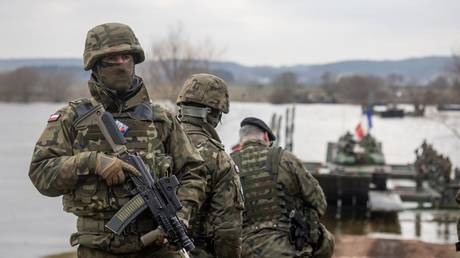 Polish military halts explosives training after string of deaths
Polish military halts explosives training after string of deaths
“Everything wants to kill you,” he told RMF. “There are mines under your feet. A man can get within 30 meters of you and throw a grenade. At 100 meters, there is a man with a [Kalashnikov]. There’s a guy standing 400 meters away with a heavy machine gun, he also wants to kill you. There’s a sniper 800 meters away. A tank is shooting from two kilometers away, and there’s artillery 10km away, also shooting at you.”
First Person View (FPV) drones are the latest battlefield horror, Mitkiewicz said, noting that they have “changed all tactics, changed this war.”
Commercial remotely piloted UAVs were initially used for observation, until both the Russians and Ukrainians began equipping them with improvised munitions. Purpose-built killer drones are now being used by both militaries.
Moscow has estimated that at least 13,387 foreign fighters have taken up arms on behalf of Kiev, of which 5,962 have been killed. While Poland has accounted for most of the mercenaries, the US was second on the list, with 1,113 fighters – of which at least 491 have been killed, according to Russian military estimates.
-
Site: RT - News
German parliamentary experts have evaluated the implications of an attack on NATO troops in Ukraine, according to a report seen by dpa
Article 5 of the NATO treaty, which enshrines the bloc's collective military response policy, would not be triggered should any member's troops deployed to Ukraine be attacked by Russia, a report by an a German parliament expert group seen by wire agency dpa has claimed.
Reflecting the principle of collective defense of the 31 NATO members, Article 5 states that an armed attack against one or more of the members shall be considered an attack against all.
“If troops of a NATO member state engage in collective self-defense (Article 51, UN Charter) in favor of Ukraine in an existing conflict (between Russia and Ukraine) and are attacked by the other party to the conflict (Russia) in the course of the battle in the conflict area, this does not constitute a case of Article 5 NATO Treaty,” the experts wrote as quoted by dpa on Friday.
According to the unpublished document, Article 5 of the NATO Treaty can only be triggered if member countries of the US-led military bloc are attacked on or over their own territory.
“A military engagement of French ground troops in favor of Ukraine would be based on the collective right of self-defense under Article 51 of the UN Charter and would therefore be permissible under international law,” the document stated.
Researchers noted that the deployment of ground troops from one NATO country to Ukraine would not automatically make all other members parties to the conflict. Only the state in question would become a party, they concluded.
Read more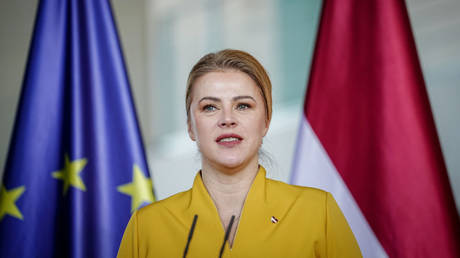 NATO not ready to deploy to Ukraine – member state
NATO not ready to deploy to Ukraine – member state
“If the NATO member state acts unilaterally – i.e. not within the framework of a previously decided NATO operation and outside NATO military command structures – neither NATO as a whole nor the other NATO partner states become parties to the conflict,” the report read.
At the same time, the document indicates that sending NATO troops to Ukraine is acceptable under international law.
French President Emmanuel Macron said last month that he “cannot exclude” the possibility of soldiers from NATO countries being sent to the country. His remarks led to a wave of denials from the leaders of other member states, who insisted that there were no plans to send Western troops to Ukraine.
The report also emphasizes that a Russian military response against targets in France, on the other hand, would constitute an “armed attack” that would establish the “factual requirements for a proclamation of the NATO alliance case.”
Russian President Vladimir Putin has labeled as “nonsense” claims by Ukraine and its backers that Russia will target NATO countries. In another interview, he stressed that Moscow would treat Western troops as “invaders” if they were deployed to Ukraine, and respond accordingly.
-
Site: RT - News
Argentinian President Javier Milei has repeatedly insulted his Colombian counterpart
Colombia has expelled all Argentine diplomats from the country’s embassy in Bogota after Argentinian President Javier Milei called Colombian President Gustavo Petro a “terrorist murderer.”
“The Argentine president’s expressions have deteriorated the confidence of our nation, in addition to offending the dignity of President Petro, who was democratically elected,” the Colombian Foreign Ministry said in a statement on Wednesday.
“In this context, the Government of Colombia orders the expulsion of diplomats from the Argentine embassy in Colombia,” the statement added.
In an interview with CNN’s Spanish-language service set to air this Sunday, Milei said of Petro: “You can’t expect much from someone who was a terrorist murderer.”
Read more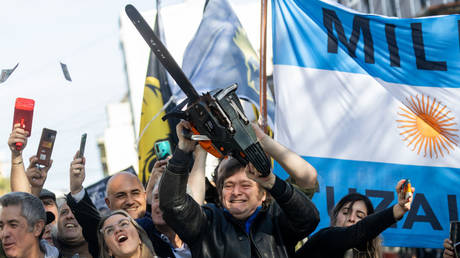 South American leader steps up ‘shock therapy’ reforms
South American leader steps up ‘shock therapy’ reforms
The Argentinian leader was referring to Petro’s past as a left-wing guerilla fighter. He joined the 19th of April Movement (M19) as a teenager in the late 1970s, before the group embarked on a campaign of kidnapping, arms theft, land seizure, and the murder of more than a dozen politicians. Petro was arrested in 1985, tortured, and jailed for 18 months for illegal arms possession.
Petro entered politics after M19 demobilized in the late 1980s, and was elected president in 2022. A left-winger, his government has – according to Justice Minister Nestor Osuna – adopted a policy of tolerance toward small-scale cocaine production. He has also struck ceasefire deals with guerilla groups and promised welfare, labor, and environmental reforms. However, the reforms have proven costly and difficult to implement, and Petro’s approval rating has fallen from 56% in 2022 to 26% at the end of last year.
Milei sits on the opposite end of the political spectrum. A libertarian right-winger, Milei was elected last year on a radical platform of economic reform. Milei has closed half of Argentina’s government departments, fired tens of thousands of bureaucrats, and promised to shut down the country’s central bank. While some of his policies have borne fruit (his deregulation of the housing market immediately slashed rents in Buenos Aires by 20% and the country achieved a financial surplus for the first time in more than a decade in January), inflation has soared above 250% and poverty has reached a record high.
Earlier this year, Colombia recalled its ambassador to Argentina after Milei called Petro “a communist murderer who is ruining Colombia.”
-
Site: RT - News
Russia’s embassy in Seoul had denounced the sketch in the Korea Herald as a vile and offensive joke
The Korea Herald newspaper has issued an apology for publishing a cartoon mocking the victims of last week’s terrorist attack at the Crocus City Concert Hall that killed more than 140 people. The apology by the South Korea-based English-language newspaper was shared on Friday by Russia’s embassy in Seoul, which had earlier voiced outraged over the sketch.
The Korea Herald expressed “deep condolences” to the victims of the shooting, adding that it “shares the unfathomable sadness” of the people affected by the tragedy.
“As such, we deeply regret the publishing of a syndicated cartoon in the March 27 edition. We regret the oversight and recognize and respect the genuine feelings of all those who have been offended,” the paper stated, adding that it acknowledges that its materials must meet “standards of common decency.”
This came after Moscow’s embassy lashed out at newspaper on Thursday for what it called a “blasphemous cartoon of the terrorist attack in Russia,” saying the appalling piece insulted the memory of the victims.
Read more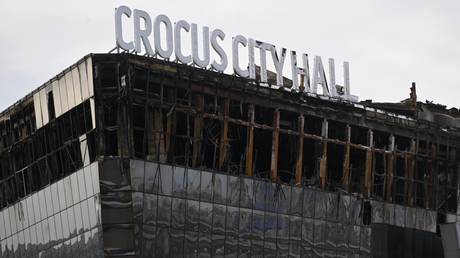 Council of Europe’s silence on Crocus terrorist attack ‘shameful’ – Moscow
Council of Europe’s silence on Crocus terrorist attack ‘shameful’ – Moscow
The embassy also wondered whether the paper was inclined to mock tragedies in other countries, or whether “such vile jokes [were] reserved only for Russia and its citizens, to whom their authors and those circulating such slander apparently do not extend the standards of the human society.”
It further stressed it was sure that this “cynical act equally offends the sentiments of South Korean citizens” sharing the grief of the Russian people.
The Crocus City Hall attack occurred last Friday when a group of gunmen armed with automatic weapons stormed the popular venue ahead of a rock concert, shooting indiscriminately at people and setting the place on fire. The act of terrorism, the worst in Russia since the early 2000s, has so far claimed 144 lives, with nearly 200 injured. Russian President Vladimir Putin has said that the suspects – whom he described as radical Islamists – were caught while fleeing toward Ukraine, where he said certain arrangements had been made to help them cross the border.
Despite tense relations between Russia and the West over the Ukraine conflict, the attack has sparked universal condemnation and a wave of condolences. People across the world flocked to local Russian diplomatic missions with wreaths and flowers to honor the memory of the victims, with South Korea being no exception.
-
Site: RT - News
Ukrainian remarks about diplomatic engagement with Moscow don’t make sense, spokesman Dmitry Peskov has said
Ukraine is contradicting itself by claiming that it could hold peace talks with Russia after a proposed summit in Switzerland later this year, Kremlin spokesman Dmitry Peskov has said.
His comments came after Ukrainian Foreign Minister Dmitry Kuleba suggested on Friday that Kiev could engage in diplomacy with Moscow following the Swiss-hosted peace summit, a date for which is still to be announced.
“Such a statement absolutely contradicts the codified ban on the President of Ukraine to negotiate with Russia,” Peskov said. In 2022, Ukrainian President Vladimir Zelensky banned all talks with the current leadership in Moscow after four former Ukrainian regions overwhelmingly voted to join Russia.
The Kremlin spokesperson also indicated that Moscow will not accept a set of rules “developed by someone else.”
Peskov’s comments echo those by the Russian Foreign Ministry, which insisted that Moscow is open to negotiations but not on Kiev’s terms. Foreign Ministry spokeswoman Maria Zakharova said earlier this month that Russia would not attend the Swiss-hosted summit even if invited, arguing that “it will be dedicated to promoting the ‘Zelensky peace formula,’” which Moscow has panned as “absurd.” Zakharova also argued that Switzerland – which has joined Western sanctions against Moscow – “can hardly serve as a platform for various peacekeeping efforts.”
Last month, Bern announced plans to organize a high-level Ukraine peace conference “by the summer” with a focus on Kiev’s ten-point ‘peace formula’ first floated by Zelensky in late 2022.
READ MORE: Ukraine could talk with Russia after Swiss summit – FM
The initiative calls for the withdrawal of Moscow’s troops from territory Kiev claims as its own, as well as the establishment of a tribunal to prosecute top Russian officials for alleged war crimes. Russia has dismissed the proposal as “detached from reality.”
Swiss Foreign Minister Ignazio Cassis said last week that a final decision on the summit – including whether the event will take place at all – will come in mid-April, noting that holding two parallel conferences remains an option.
-
Site: RT - News
With the event just three months away, the attack in Russia has prompted Paris to tighten anti-terrorism measures
France has called on its international allies to help enhance security for the upcoming Olympic Games, in Paris, AFP reported on Thursday, citing sources in the government.
According to the report, Paris has asked 46 nations to send 2,185 police reinforcements for the duration of the games in order to take over tasks that require additional specialists.
The French authorities have not yet confirmed that such a request was made, but Polish Defense Minister Wladyslaw Kosiniak-Kamysz on Thursday announced on X (formerly Twitter) that his country’s armed forces would “join the international coalition established by France” to provide additional security at the Olympics. He didn’t reveal the size of the contingent Warsaw plans to send, but noted that it would deploy canine units whose job will be to “detect explosives and counteract terrorist activities.”
An Interior Ministry source told AFP that the request for reinforcements is a “classic move for host countries ahead of the organization of major events.” However, the news comes just days after Paris raised the terrorism threat level in the country to its highest level following the deadly attack in Moscow, which killed more than 140 people.
On March 22, four gunmen stormed the Crocus City Hall concert venue just outside Moscow, going on a shooting spree and setting the building on fire. The gunmen had allegedly been recruited on behalf of ISIS-K, an Afghanistan-based offshoot of the terrorist organization Islamic State.
Russian investigators later revealed that the perpetrators had received funding for the attack from Ukraine.
Read more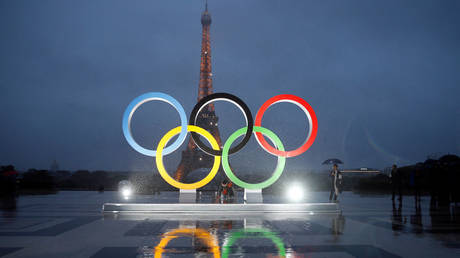 France to propose ‘Olympic ceasefire’ for Ukraine conflict – Macron
France to propose ‘Olympic ceasefire’ for Ukraine conflict – Macron
In a press statement following the attack in Russia, French Prime Minister Gabriel Attal said that the threat of terrorism in France is “real and strong,” adding that the country’s intelligence services have foiled 45 terror plots since 2017. He noted that France’s current anti-terror security measures, part of the country’s national security alert system called the Vigipirate Plan, will be tightened in the coming weeks, with security forces maintaining a more visible presence on streets and in front of possible targets such as government buildings, transportation infrastructure, and schools.
The Vigipirate Plan has been in place since 2015, when France faced a series of devastating terror acts linked to Islamic State. They included the attack at the Bataclan concert hall, the Stade de France stadium, and drive-by shootings and suicide bombings across Paris.
This year’s Olympics will run from July 26 to August 11. Around 45,000 French police and gendarmes, 18,000 troops and up to 22,000 private security guards are expected to work at the games, AFP reported, citing official figures.
-
Site: RT - News
Last week’s terrorist attack in Russia has reportedly raised concerns over the event becoming a target
French intelligence services have recommended scrapping plans for a grand opening ceremony for the 2024 Paris Olympics because of security concerns, the Europe1 news outlet has reported, citing sources.
Under the current plan, the ceremony in the French capital on July 26 is set to be a lavish event on the River Seine, involving a boat parade of athletes and tens of thousands of spectators watching the proceedings along the banks.
However, France’s General Directorate of External Security (DGSE) is reportedly worried that the scope of the event is too big, and that it presents too many safety risks in the face of potential terrorist plots.
“We have to switch to plan B,” an intelligence source told the news outlet. The existence of a contingency for the opening ceremony was first mentioned by French President Emmanuel Macron in December. While it is currently unclear what the plan entails exactly, French media have speculated that it may involve anything from cutting the scope of the venue to calling off the athletes’ parade on the Seine completely and moving it to an indoor space.
According to a Europe1 source, French security services have been forced to reassess the threat to the Olympics after Friday’s terrorist attack in Russia, in which four gunmen stormed the Crocus City Hall concert venue near Moscow, killing over 140 people and injuring many others.
The gunmen responsible for the massacre, identified as Tajik nationals, were apprehended hours after the attack in a Russian region bordering Ukraine. Russian President Vladimir Putin has described the perpetrators as radical Islamists. They had allegedly been recruited through an online chat operated on behalf of ISIS-K, an Afghanistan-based offshoot of the terrorist organization Islamic State (IS, formerly ISIS). Russia’s Investigative Committee on Thursday also claimed that the perpetrators were linked to Ukrainian nationalists and had received funding for the attack in the form of cryptocurrency.
Read more French strongly fear new terrorist attacks – poll
French strongly fear new terrorist attacks – poll
France raised the terrorism threat level in the country to its maximum following the assault in Russia.
“For the past week, there has been a lot of moving around among the Central Asian nationals that we usually follow,” the intelligence source told Europe1. He added that the agency has stepped up monitoring Turkmen, Kyrgyz, and Kazakh nationals and suspected Islamists in order to uncover potential plots targeting the Olympics.
The DGSI was scheduled to discuss its concerns regarding the opening ceremony and overall security of the Games with Interior Minister Gerald Darmanin on Thursday.
The Paris 2024 Olympics are set to be held from July 26 to August 11, followed by the Paralympics from August 28 to September 8.
-
Site: RT - News
The world is now facing the most critical moment since the end of World War II, the Polish prime minister has said
Europe has entered a “pre-war era” in which any scenario is possible and the threat of war is no longer a thing of the past, Polish Prime Minister Donald Tusk said in an interview with European media outlets on Friday.
Tusk was asked whether war is inevitable in light of recent remarks from a number of Western politicians about Russia potentially attacking NATO. He replied that “literally any scenario is possible.”
“I don’t want to scare anyone, but war is no longer a thing of the past. It is real and in fact it started over two years ago,” Tusk said.
“I understand that it will sound devastating, especially to the younger generation, but we have to mentally prepare for the arrival of a new era. We are in a pre-war era. I am not exaggerating.”
The Polish prime minister went on to say that the West needs to do everything it can to provide Kiev with equipment and ammunition, because the world is now in the most critical moment since the end of World War II.
“The next two years will decide everything,” Tusk said, adding that if the bloc does not provide enough arms for Ukraine and it is defeated, “no one in Europe will be able to feel safe.”
Read more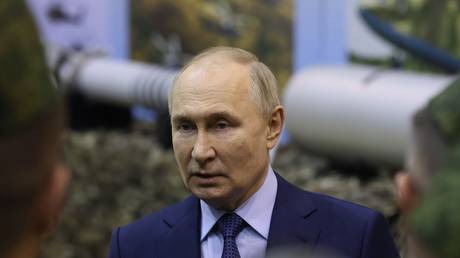 Talk of Russia attacking NATO is ‘nonsense’ – Putin
Talk of Russia attacking NATO is ‘nonsense’ – Putin
While urging the cultivation of “transatlantic ties” regardless of who the next US president is, Tusk argued that the EU should be more independent from NATO and self-sufficient in terms of defense.
“We will be a more attractive partner for the United States if we are more self-sufficient in defense,” he said.
Claims by Western officials that Russia may attack NATO are “nonsense,” President Vladimir Putin stated on Wednesday. He noted that Kiev’s backers have tried to drum up support for additional aid by claiming that Russia will not stop if Ukraine is defeated on the battlefield.
US “satellites” in Eastern Europe have no reason to be afraid, Putin said. Talk of a potential Russian attack on Poland, the Czech Republic, or the Baltic states is just propaganda by governments that seek to scare their citizens “to extract additional expenses from people, to make them bear this burden on their shoulders,” he added.
-
Site: RT - News
Israel is reportedly standing in the way of discussions on post-war planning in the Palestinian enclave
The US has offered funding to partners in the Middle East for a peacekeeping force in Gaza, which would police the Palestinian enclave after the hostilities with Israel are over, Politico reported on Thursday.
Gaza has been left devastated after five months of Israeli bombardment and siege, and according to aid groups is on the brink of famine. West Jerusalem is seeking to obliterate Palestinian armed group Hamas, which staged an incursion from the enclave into southern Israel in October, killing around 1,200 people and capturing scores of hostages. Over 32,600 people have been killed in Gaza since, according to Palestinian health officials.While it remains unclear when the fighting in Gaza will end, the US has been engaging regional partners to discuss how the situation might look the “day after” the war. Washington has offered to pay for a “peacekeeping force” that would not include US soldiers and could be led by Palestinians, four official sources, including two from the Pentagon, told Politico.
Read more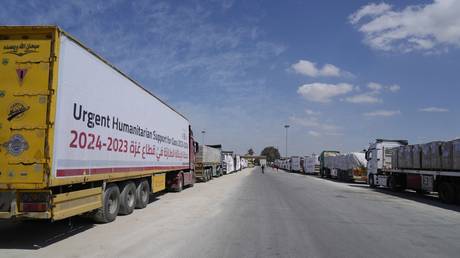 UN court orders Israel to let food into Gaza
UN court orders Israel to let food into Gaza
Arab nations want a clear commitment to a Palestinian state as part of the resolution, the outlet noted. It added that Israel is “reluctant to have these conversations” until it defeats Hamas – a goal that skeptics say may be impossible to achieve. Israeli Prime Minister Benjamin Netanyahu has vowed not to allow the creation of a Palestinian state.
“Israel is the long pole in the tent,” an anonymous military official told Politico. “It would be one thing if the [US] administration and the Israeli government were aligned on the way ahead, but that is just not the case.”
The rift between Washington and the Jewish state has become increasingly evident. Earlier this week, the US allowed a resolution urging for an immediate ceasefire to pass at the UN Security Council. Washington abstained in the vote, unlike during numerous previous attempts, when it vetoed proposed documents with the same wording.
READ MORE: White House believes Netanyahu deliberately ‘provoking’ US – Axios
Earlier in March, US Senate leader Chuck Schumer said in the chamber that Netanyahu “has lost his way by allowing his political survival to take precedence over the best interests of Israel.” The remark was rebuked by Israel and the Republican Congressional leadership, although President Joe Biden said his key ally had delivered “a good speech.”
-
Site: RT - News
CEO Pavel Durov claims to have banned thousands of users for inciting violence after the Crocus City Hall attack
Telegram has clamped down on users that spread calls to commit acts of terrorism, and will implement technological hurdles to limit the activity in the future, the messenger app’s founder, Pavel Durov, wrote on Thursday.
Russian-speaking Telegram users have been bombarded with anonymous messages this week, in which strangers attempt to persuade them to commit acts of terrorism, Durov said. The app’s administrators reportedly took steps to deal with this within an hour of receiving the first complaints on Sunday.
“As a result, tens of thousands of attempts to send such messages were stopped, and thousands of users participating in this flash mob faced permanent bans of their Telegram accounts,” the Dubai-based entrepreneur said.
Starting next week, Russian, Belarusian, and Ukrainian users will be able to limit who is able to send private messages to them, Durov added. Telegram also plans to deploy ‘AI-related’ mechanisms to process complaints faster.
Telegram is no place for spam and incitements to violence.
The messenger app has come under increased scrutiny after last Friday’s terrorist attack at the Crocus City Hall outside of Moscow claimed 143 lives, including three children. Four suspects, who were described by President Vladimir Putin as “radicalized Islamists,” were intercepted while fleeing towards the Ukrainian border.
Read more Kremlin urges Telegram to work harder to prevent terrorism
Kremlin urges Telegram to work harder to prevent terrorism
The suspected perpetrators of the massacre were allegedly approached by the organizers through a now-deleted Telegram group, which was operating in the name of the Afghanistan-based splinter organization of Islamic State (IS, formerly ISIS), according to law enforcement sources cited by Russian media.
Telegram is the most popular information source among young people in Russia, and also the number one messaging app in Ukraine. It was created as an instant-messaging platform by Russian entrepreneurs Pavel and Nikolay Durov in 2013. What sets it apart from similar applications is the ability to create public broadcast channels and discussion groups.
Ukrainian military intelligence chief Kirill Budanov said on Wednesday that Telegram is a double-edged sword, as it allows Kiev to “spread its message” in Russia, but may have a “destructive effect” inside Ukraine. Officials in Kiev have called for it to be banned, lamenting the fact that Telegram has enabled people to bypass government censorship after President Vladimir Zelensky used martial law to place all media under the state’s umbrella.
READ MORE: Telegram a national security issue – Ukraine’s top spy
In Russia, the Kremlin has urged Durov to “pay more attention” to the misuse of the platform, with spokesman Dmitry Peskov noting on Thursday that “this unique and technologically phenomenal service… is increasingly becoming a tool for terrorists.” Asked whether Telegram could be banned, however, he said there are no plans to do so.
-
Site: RT - News
A military agreement with Washington comes at a cost, Helsinki has acknowledged
A new military cooperation deal agreed with Washington will limit Helsinki’s sovereignty, the Finnish Foreign Ministry said on Thursday, advising that its ratification will therefore require a two-thirds majority in the parliament.
Finland joined NATO in April 2023, abandoning a decades-long policy of neutrality. It began negotiating a Defense Cooperation Agreement (DCA) with the US almost immediately, and signed it last December.
A working group led by the Foreign Ministry was set up to draft the ratification protocols which were formally sent to the country's parliament for comments on Thursday, the ministry announced.
“The working group concludes that the DCA would restrict Finland’s sovereignty, which is why Parliament’s acceptance of the agreement would require a two-thirds majority of the votes cast,” the ministry press release said. The parliament has until May 12 to comment on the draft proposal.
Read more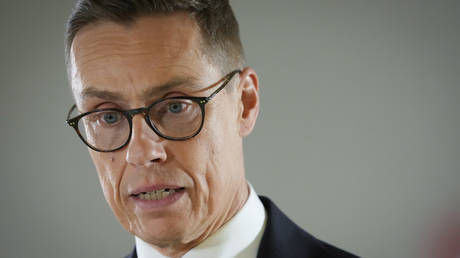 Finland’s new president hails American nuclear weapons
Finland’s new president hails American nuclear weapons
The DCA gives the American military access to 15 bases in Finland and allows the deployment of military equipment and supplies on Finnish territory, as well as the free movement of US aircraft, ships, and vehicles. Members of the US military and the facilities they use would also get special legal protections.
When the DCA was signed, Finnish Defense Minister Antti Hakkanen said it was “a guarantee from the world’s largest military power that they will defend us.”
Russian President Vladimir Putin responded by saying that Helsinki previously enjoyed cordial relations with Moscow and had no disputes, territorial or otherwise, but chose to side with the US-led bloc anyway.
“There was no trouble. Now there will be,” Putin said in December. “We will now create the Leningrad Military District and concentrate certain military units there.”
-
Site: RT - News
The Jewish state must immediately open more border crossing points to tackle a spreading famine, the ICJ’s judges have ruled
The International Court of Justice (ICJ) has ordered Israel to allow uninterrupted shipments of food into Gaza. Before issuing the legally-binding order, the Hague-based court warned that “famine is setting in” in the besieged enclave.
Issued on Thursday, the order commands Israel to take “all necessary and effective measures to ensure, without delay, in full cooperation with the United Nations, the unhindered provision…of urgently needed basic services and humanitarian assistance,” including food, water, and medicine.
The ruling comes two months after the court ruled that “the state of Israel shall take all measures to prevent the commission of genocide in Gaza,” including by blocking humanitarian aid shipments.
“The court observes that Palestinians in Gaza are no longer facing only a risk of famine … but that famine is setting in,” the judges wrote in Thursday’s ruling. Israel can help alleviate this looming famine “by increasing the capacity and number of land crossing points and maintaining them open for as long as necessary,” they noted.
Read more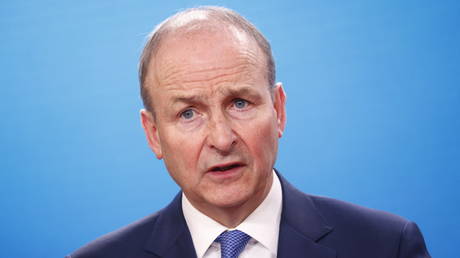 Ireland to intervene in South Africa’s genocide case against Israel
Ireland to intervene in South Africa’s genocide case against Israel
The Israeli military controls all entry and exit points to Gaza except the Rafah crossing between the enclave and Egypt. However, Cairo allows Israel to determine when the crossing can be opened, and Israeli troops inspect every truck that passes. Every other crossing has been shut since Israel imposed a siege on Gaza immediately after Hamas militants attacked the Jewish state on October 7, and aid groups say that the trickle of supplies passing the Rafah crossing is insufficient to feed Gaza’s starving population.
A UN-backed report warned last week that more than 70% of Gaza’s 2.3 million residents are facing “catastrophic hunger,” and that famine conditions now exist in the northern part of the enclave. At least 27 children have already starved to death, the ICJ judges noted on Thursday.
Thursday’s order was requested by South Africa, which filed a legal action last year accusing Israel of committing “systematic” war crimes and genocide in Gaza. Israel denies that it is committing genocide and insists that its military campaign against Hamas – which has killed more than 32,000 Palestinians, mostly women and children – is legitimate self defense.
-
Site: RT - News
Roma and people of African descent face “systemic discrimination” at the hands of the UK justice system, a new report has said
The level of racial discrimination in Great Britain is concerning, the UN Human Rights Committee has said in a new report, warning that “systemic” racism remains largely unaddressed by the government and that cases “appear to be increasing.”
The committee said it was concerned by reports indicating that “racial inequality and discriminatory practices” against Roma and people with African background, as well as other minority groups, are on the rise.
Those of African descent in particular face “systemic racism, disproportionate and discriminatory policing” at the hands of the British criminal justice system, the UN body said, pointing to “unjustified racial and ethnic disparities in stop and search powers” among others.
The UN document recommended that the UK allocate more resources to fighting racism and review its anti-discriminatory policies, in addition to providing “adequate training” to civil servants and law enforcement officials.
The committee also voiced its reservations over the perceived impunity granted to the UK military participating in overseas operations. The UN body “regrets that no prosecutions or further investigations have been carried out on the allegations of war crimes committed by British soldiers in Iraq,” the document said.
Read more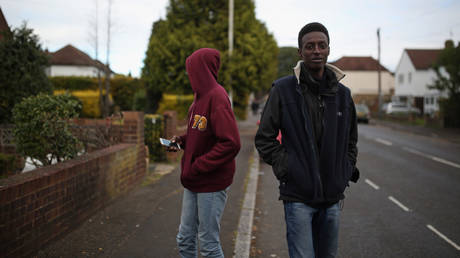 UK accused of ‘unashamed racism’ in refugee policy
UK accused of ‘unashamed racism’ in refugee policy
It pointed to the 2021 Overseas Operations Act, which it said granted “a presumption against prosecution in favor of military personnel deployed” outside of British territory after five years.
London must “ensure all violations committed by British officials and members of the armed forces, including overseas, are investigated, prosecuted as appropriate, and duly sanctioned without a time limitation,” the committee said.
Last year, the UK was also accused by a group of immigration experts of “unashamed racism” over its policies towards Ukrainians relative to those who had come from countries such as Sudan. The seemingly preferential treatment of Ukrainians was due to the color of their skin, experts told The Guardian at the time.
The government develops policies affecting those seeking safety “along stark racial lines,” Caitlin Boswell, a policy and advocacy manager for the Joint Council for the Welfare of Immigrants (JCWI), told the British newspaper. London denied the allegations, saying that it was “wrong to compare and set vulnerable groups against each other.”
-
Site: RT - News
The marine mammals should be given inherent human rights, the king of New Zealand’s indigenous Maori people has urged
The king of New Zealand’s indigenous Maori people has signed a ‘Declaration for the Ocean’ that calls for whales to be granted legal personhood as part of a plan to protect them, AFP reported on Thursday.
The declaration reportedly recognizes the mammals as legal persons with the inherent right to freedom of movement, natural behavior, and expression of their unique cultures. The declaration has been made with the intent of helping whales recover their depleted population.
“The sound of our ancestor’s song has grown weaker, and her habitat is under threat, which is why we must act now,” King Tuheitia Potatau te Wherowhero VII was quoted as saying.
He was echoed by high chief Travel Tou Ariki, who said: “We can no longer turn a blind eye. Whales play a vital role in the health of our entire ocean ecosystem … We must act with urgency to protect these magnificent creatures before it’s too late.”
Whales have traditionally had cultural significance for the Maori as supernatural beings and as harbingers of spiritual growth. Some tribes see the mammals as the descendants of Tangaroa, the god of the ocean.
Read more Maori tribe issues demand to elite auction house
Maori tribe issues demand to elite auction house
Whales are some of the largest mammals on earth, with blue whales reaching up to 30.5 meters (100 feet) in length and weighing up to 200 tons. Many of the species are endangered.
The move to grant whales personhood would not be without precedent. In 2017, New Zealand passed a groundbreaking law granting personhood status to the Whanganui River and Mount Taranaki volcano, both of which are important to the Maori people.
The Maori are the second-largest ethnic group in New Zealand and currently make up about 17% of the country’s total population, or about 900,000 people.
-
Site: RT - News
Giorgia Meloni has suggested that leaders “pay attention to the tones we use” when discussing direct military involvement
Italian Prime Minister Giorgia Meloni has said that she told French President Emmanuel Macron about her disagreement with his recent remarks about the possibility of sending troops to Ukraine.
Meloni reiterated her opposition to any kind of direct military involvement on the Rete4 talk show on Wednesday night.
“I did not agree with Emmanuel Macron’s words about the Ukraine conflict and I told him so,” she said. “I am convinced that we must pay attention to the tones we use.”
The prime minister also touched upon recent discussions at an EU summit on civil protection that have sparked media speculation about Europe preparing for war. The summit was “exclusively about coordinated actions on protecting the population in the event of natural disasters,” she said.
Numerous Western leaders, including US President Joe Biden and German Chancellor Olaf Scholz, have publicly ruled out sending NATO troops to Ukraine following Emmanuel Macron’s comments last month that he “cannot exclude” such a possibility.
NATO Secretary-General Jens Stoltenberg also refuted the idea shortly after Macron’s initial statement, stating that there were no plans to deploy troops to Ukraine.
Latvian Prime Minister Evika Silina insisted at a joint press conference with Scholz on Wednesday that NATO states are not ready for talks about sending ground forces.
READ MORE: NATO not ready to deploy to Ukraine – member state
Moscow has warned that NATO troops in Ukraine would likely make a direct confrontation between Russia and the US-led bloc inevitable. Russia considers the Ukraine conflict to be a proxy war by the West, and has repeatedly said that by aiding Kiev, NATO members are prolonging the hostilities.
Russian President Vladimir Putin has called “nonsense” claims by Ukraine and its allies that Russia will target NATO states. In another interview, he stressed that Moscow would treat Western troops as “invaders” if they are deployed to Ukraine, and respond accordingly.
-
Site: RT - News
They have no intention of serving in the IDF, and the patience of seculars is about to run out
The Ultra-Orthodox community of Israel is generally exempt from compulsory military service. Over the years, the state has tried to change this. These attempts have largely failed, in part because the country failed to pass a law that would regulate their service.
Yanki Farber, a Haredi journalist from the city of Bnei Brak, central Israel, is not a typical representative of the Ultra-Orthodox community, which currently stands at 1.25 million people, or roughly 12.5% of the population.
When he was 18, Farber enrolled into the IDF, and after his release around three years later, he has on occasion been called up to the reserves. When the events of October 7, 2023 took place – with Hamas militants launching a deadly attack on southern Israeli communities – he put on his military uniform again and went to serve.
But Farber is an exception, not the rule. Historically, Ultra-Orthodox Jews, who were a minority when the State of Israel was established in 1948, received exemptions from military service. Back then, it was agreed that they would serve the state by praying, even though some did enroll in the IDF, especially in times of war and in cities that were attacked by Arab armies.
Read more ‘I don’t want to be a pawn in this sick game’: Israel’s anti-Zionist fringe is taking a stand
‘I don’t want to be a pawn in this sick game’: Israel’s anti-Zionist fringe is taking a stand
In the 1990s, when their population started growing, Israel tried to encourage them to serve, but despite their efforts, the IDF only managed to recruit 31 individuals in 1999.
Over the years, the situation has significantly improved. In 2016, the total stood at 2,850. Recently, the military announced that it has around 6,000 Haredi soldiers in its ranks. The events of October 7 have also given the numbers a boost, though this is still just a drop in the ocean.
“The majority of the Haredis do not serve because they are afraid that in the military they will be exposed to a variety of different opinions,” Farber said.
“Over there, they are likely to encounter soldiers from the LGBT community, Druze and the Bedouins. They will serve with women – and this encounter can change their minds. This can weaken their religious beliefs, something the rabbis are worried about,” he added.
But Ronen Koehler – an Israeli colonel in the reserves and one of the key activists in Achim Laneshek (Brothers in Arms), an organization that unites reservists who fight for equality in military service – says the roots of the problem run much deeper.
“It is true that the rabbis of the Ultra-Orthodox don’t want to expose their younger generation to modernity [by sending them to the IDF – ed.]. But what’s also true is that the more students they have, the more money their yeshiva [religious school] receives. They treat it as a business, and they have no plans to loosen their grip.”
In 2021, it was estimated that Israel spent $83 million annually on its 54,000 young yeshiva students. In addition, it forked out $248 million a year on religious students with families. This budget was increased in 2023 to cater to the fast-growing population of Haredis, and experts believe these funds will continue to grow.
 FILE PHOTO: Ultra-Orthodox Jewish men block a road during a demonstration against army conscription in Bnei Brak.
© Global Look Press / Ilia Yefimovich
FILE PHOTO: Ultra-Orthodox Jewish men block a road during a demonstration against army conscription in Bnei Brak.
© Global Look Press / Ilia Yefimovich
This excessive spending frustrates Koehler, but he is also fuming about the repercussions of this policy on Israeli society.
“They sit in the yeshiva until the age of 26 [after which they are automatically exempt from military service – ed.]. They do not study core subjects. Nor do they learn for a certain profession. So when they finish their studies, they don’t have a job. They can’t integrate into the market, they become a burden on the economy, and the whole country is paying the price.”
However, for Koehler, it is not only about money. It is also about equality and principles.
“It is unacceptable that an 18-year-old secular boy who has just finished his studies will go to the IDF, where he will spend three years of his life, whereas his religious peer will not do the same. I am not saying they [Haredis – ed.] all need to go to combat units. But they do need to serve the state, by either volunteering in hospitals, schools, by serving in cyber units, or anything else.”
Read more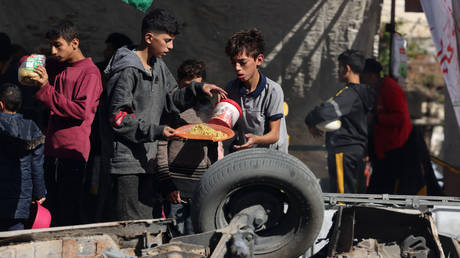 The hunger killing Gaza’s children has a clear cause that few are willing to name out loud
The hunger killing Gaza’s children has a clear cause that few are willing to name out loud
Oddly enough, the Israeli government, led by Prime Minister Benjamin Netanyahu, looks at it differently.
In December 2023, two months after the outbreak of the war, the Knesset passed a law that increased the age at which exemption from military service is granted, pushing it from 40 to 41 for ordinary reservists, and from 45 to 46 for officers.
In addition, the Knesset is considering the possibility of increasing the number of days reservists are obliged to serve. Right now, Israeli reservists give the state 54 days over the course of three years. The plan is that they will now need to serve 42 days a year, or 126 in total.
“This policy contradicts any common sense,” Koehler said.
“It is clear that now [because of the war – ed.] the army needs more people – no complaints there. But instead of solving the issue by increasing the number of recruits, they burden those who already serve even more. It creates inequality and frustration because those who do enlist don’t have a life and they also face a tough attitude from their employers,” he added.
This frustration has translated into action. Last Thursday, thousands gathered in Tel Aviv to demand equal treatment regarding IDF service. Protesters urged the government to enlist Haredis and pass a law that would regulate their service.
But the government seems to be dragging its feet. For years, liberal groups have appealed to the High Court of Justice, urging it to force the government to adopt a law that would equate Haredis to seculars when it comes to military service. They also want the state to stop financing religious institutions that don’t send their students who are ineligible for an exemption to the military.
In 2017, it was finally ruled that the chapter in the security service law that dealt with the postponement of Ultra-Orthodox service should be repealed. Each year, however, the government was allowed to prolong it, until in 2023 it finally expired. The government of Netanyahu, which relies on religious parties, was given until March 31, 2024 to come up with a concrete law that would regulate the conscription of Haredis – but the prime minister asked on March 28 for an extension of 30 days to normalize the law. His attorney general has expressed a different opinion, urging the High Court to cut the funding for the yeshivas and begin the enlistment of Haredis on April 1.
 FILE PHOTO: Ultra-Orthodox Jewish men block a road during a demonstration against army conscription in Bnei Brak.
© Global Look Press / Ilia Yefimovich
FILE PHOTO: Ultra-Orthodox Jewish men block a road during a demonstration against army conscription in Bnei Brak.
© Global Look Press / Ilia Yefimovich
For liberals, however, it might not be enough.
“They kept on postponing this law year after year. Now the time is up... if this government decides that it will abide by the law [the decision of the High Court – ed.] and passes the legislation, it will be good for everyone,” Koehler said.
“Unfortunately, this government proved time and time again that it has no problem to break the law, and ignore the ruling of the Court. If this will be the case again, anything can happen,” he added.
A number of liberal groups have warned that they will take to the streets in protest if Haredis are not called up to serve – especially now, when the IDF urgently needs 10,000 people to curb the threat of terrorism emanating from Gaza.
Read more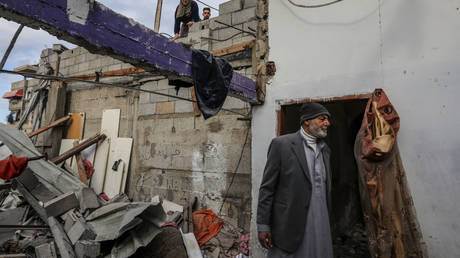 Unethical, hypocritical and cruel: Western aid cut will cause more pain for starving Gaza civilians
Unethical, hypocritical and cruel: Western aid cut will cause more pain for starving Gaza civilians
Liberals are also expected to demand that the money Israel spends on yeshivas and various religious institutions be significantly reduced. But Farber, who studied in the yeshiva himself, says this approach will never work.
“Applying force will not work. If such a law passes, the Haredis will leave the government, collapse the coalition, and go to sit in the opposition. Over there, they will wait for better days, when another government comes and gives them what they want. One thing is for sure, they won’t send their youngsters to the IDF.”
Koehler is aware of the sensitivities. He doesn’t believe in force either. Rather, he is sure the Haredis can be convinced that military service can benefit them in the long run.
“We need to explain to them that by serving, they end up getting more money that they can use to finance their families. After finishing the military, they have a chance to earn 35,000 NIS [roughly $9,600 – ed.] instead of working as a yeshiva teacher and get 5,000 NIS per month [$1,370 – ed.]. Rabbis will not get it but the younger generation will, and we need to talk to them.”
What happens if convincing the Haredis does not work, and the government, which needs their support to remain in power, keeps on delaying the passage of the law? Koehler promises his camp will not sit idly by.
“We are responsible people and we will not burn the state, if it comes to this. But with each day that passes, we see more and more injustice. We witness more examples of the government acting illegally, and our anger and frustration mounts. One day it might as well explode,” he warned.
-
Site: RT - News
The US wants a reformed Palestinian Authority to govern Gaza, but Israel has ruled out the plan
Palestinian Authority President Mahmoud Abbas announced the formation of a new government on Thursday, with his premier stating that he intends for the PA to assume “responsibility for Gaza” when the Israel-Hamas war ends.
Abbas, who has led the PA since 2005, revealed his new cabinet in a presidential decree. The 88-year-old tapped his former adviser, Mohammed Mustafa, to serve as prime minister, and revealed that the cabinet will include three women and six officials from Gaza.
Mustafa, a US-educated economist, replaces Mohammad Shtayyeh, who resigned along with his entire cabinet last month. Shtayyeh said he stepped down due to “political, security, and economic developments related to the aggression against Palestinian people in the Gaza Strip, and the unprecedented escalation” against PA-governed territory in the West Bank.
Mustafa has said that his “top national priority” will be to end the war in Gaza, before “formulating visions to reunify the institutions, including assuming responsibility for Gaza,” AFP has reported.
Read more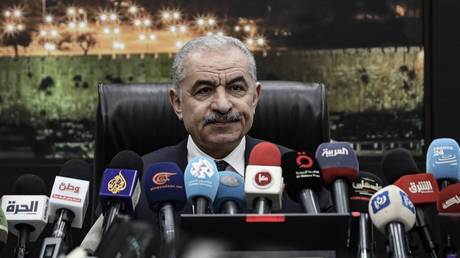 Palestinian government resigns
Palestinian government resigns
Based in the city of Ramallah, the Palestinian Authority exercises civilian control over around 40% of the West Bank, while the rest of the territory is under full Israeli military and civilian control. The PA is composed mostly of political parties under the umbrella of the Palestine Liberation Organization, and is dominated by Abbas’ Fatah faction.
Gaza, however, has been under the control of Hamas since 2007, when the militant group won a brief and bloody armed conflict with Fatah. Hamas views the PA as illegitimate over its recognition of and negotiation with Israel.
US President Joe Biden has argued that post-war Gaza should be governed by a “revitalized Palestinian Authority.” After a meeting with Abbas in January, US Secretary of State Antony Blinken told reporters that Washington wants a reformed PA to “effectively take responsibility for Gaza” when the fighting stops.
However, Israeli Prime Minister Benjamin Netanyahu has shot down the plan, insisting on “full Israeli security control” over the enclave for the foreseeable future. Furthermore, the PA has little popular support among Palestinians due to Abbas’ refusal to hold elections, his willingness to allow Israeli troops to operate at will in the West Bank, and his failure to stop the spread of illegal Israeli settlements in the territory.
-
Site: RT - News
The hostilities between Kiev and Moscow cannot be resolved on the battlefield, Gerhard Schroeder believes
Talking to Moscow is the only way to end the hostilities between Russia and Ukraine, former German Chancellor Gerhard Schroeder told the press agency dpa in an interview published on Thursday. His personal friendship with President Vladimir Putin could play a role in stopping the bloodshed, Schroeder said.
The former chancellor and Russian leader are known to have close ties that stretch back to when Schroeder headed the German government in the late 1990s. In 2014, Putin attended Schroeder's birthday party in St. Petersburg.
Later, Schroeder joined the boards of directors of the Russian operator of the Nord Stream gas pipeline and energy giant Rosneft. He faced a backlash over his ties to Moscow after the conflict between Russia and Ukraine erupted in February 2022 – and resigned from the Rosneft board in May of that year.
Asked about maintaining his friendship with Putin amid the Ukraine conflict, the former chancellor insisted the two matters were entirely distinct.
Read more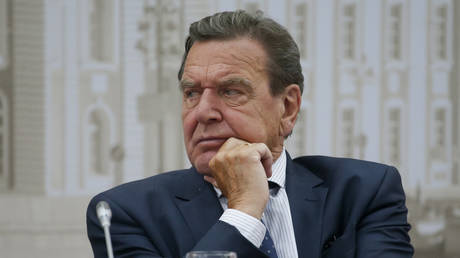 Putin is still my friend – ex-German chancellor
Putin is still my friend – ex-German chancellor
“I think it would be completely wrong to forget all the positive things that have happened between us in politics in the past,” he told the German news agency, adding that breaking relationships with friends was “not his style.”
Contacts with the Russian leadership could still prove crucial in the future peace talks, Schroeder believes.
“We have worked together sensibly for many years. Perhaps that can still help to find a negotiated solution,” he said, telling dpa that he saw “no other way” to end the conflict.
“It is obvious that the war cannot end with the total defeat of one side or the other,” Schroeder said.
Read more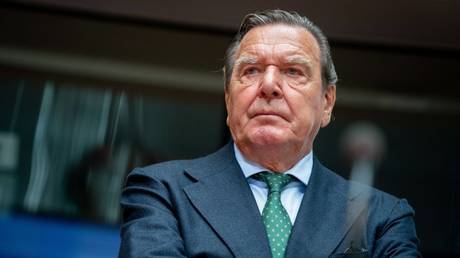 US forced Ukraine to reject peace with Russia – ex-German chancellor
US forced Ukraine to reject peace with Russia – ex-German chancellor
The former chancellor has repeatedly called for a negotiated solution to the conflict and accused the US of forcing Kiev to reject a peace deal with Moscow. In October 2023, he also said that Western Europe had “failed” to seize the opportunity to push for peace in March 2022.
Schroeder himself traveled to Istanbul and Moscow on a “peace mission” in the spring of 2022 and also met Putin in July of the same year. His efforts yielded no results at that time.
In Germany, Schroeder was ostracized by his own party, which deprived him of his parliamentary privileges, but failed in an effort to expel him over his ties to Russia. In 2023, he relinquished his honorary citizenship of Hannover before the city could strip him of it.
Moscow has repeatedly said it is ready for peace talks as long as the situation on the ground is taken into account. Ukraine has insisted on Russian troops withdrawing from all the territories it claims as its own, including Crimea and the four former Ukrainian territories that joined Russian following a series of referendums in autumn 2022. Russia has dismissed such demands as “absurd.”
-
Site: RT - News
A leading member of the Palestinian organization’s politburo shares his thoughts on the planned US port in Gaza, internal conflicts, and more
Dr Basem Naim, a leading member of Hamas’ politburo, has told RT that the war in Gaza is being fought by a joint command of Palestinian groups in the besieged coastal enclave, not only Hamas.
He also discussed Hamas-Russia relations, regional alliances and internal Palestinian politics. Dr Naim raised concerns about the US plan to build a port in Gaza, which he warned could be used by the Israelis to commit further war crimes against the Palestinian people.
Since the beginning of the war in Gaza, little has been revealed by Western media regarding the coordination between Palestinian armed factions, which represent around a dozen groups based in the besieged territory.
In addition to this, most interviews with Hamas officials focus on “gotcha questions” and the events of October 7, without delving into substance or detail. This could be down to the fact that most Western nations consider Hamas to be a terrorist organization, along with every other major Palestinian political party/movement, the only exception being the mainstream branch of the Fatah party. However, throughout the rest of the world, most of these movements, including Hamas, enjoy open relations and dialogue.
The planned US Gaza sea port
The US is planning to build a sea port in Gaza, an idea that reportedly originally came from Israeli Prime Minister Benjamin Netanyahu, with the stated goal of facilitating the delivery of humanitarian supplies. While Dr Naim believes the port could allow aid to be delivered much more easily and directly, this would require a stable ceasefire, and that should be the main priority.
“Now, when it comes to this step, yes, on one hand we could see it as a positive step in the right direction. But, at the same time, why are they going this very long and complicated way? The shortest and easiest way is to oblige Israel to open all the ground crossings and to allow all the requirements of Gazans to come in and to allow all international bodies, including UNRWA, to work freely on the ground,“ he said.
"Second, which is more important, is to stop the aggression. How can aid be distributed inside the Gaza Strip while the Israelis continue firing? We are reading every day about people being killed while they are waiting for aid trucks to enter Gaza, especially in the north. All the international bodies have clearly stated, or declared, that no one can talk about satisfactory humanitarian aid without a ceasefire. Therefore, the first and most important step is to stop the firing.
Read more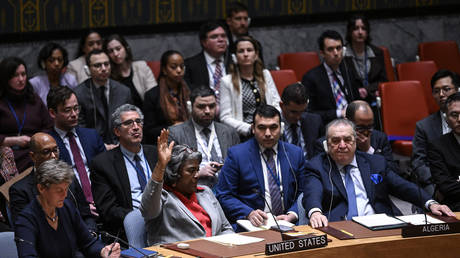 Why the US decided to give peace in Gaza a chance
Why the US decided to give peace in Gaza a chance
“When it comes to how this affects the reality in the field, yes, there are ways that this port could be used for other purposes. Maybe it is not clear now, but there is something there,” continued Dr Naim.
When asked what other purposes he meant, he raised the following frightening prospect:
“I think this could be used for an American presence here. For example, this could be part of a long-term plan for control, by the Americans and the Israelis, of the seashore and of the landline from the west to the east.
“It could be, theoretically, a way to allow more people to leave the Gaza Strip under this inhuman situation on the ground. How can this aid port work without a partner on the ground? and who is the partner? and how will this partner work? How will it operate? Who will receive the aid and donations?
“I think there are a lot of questions which should be raised, and also we are in need of a lot of answers. But again, this could be seen as an urgent step to help the people and seen as a positive step. But we have to keep in mind that the other way of transferring aid is shorter and easier.”
Hamas and Palestinian political unification
The Palestinian attack on Israel that started the war on October 7, in which more than 1,000 people were killed and over 200 were taken hostage, is often linked solely to the armed wing of Hamas.
However, several other Palestinian armed movements including secular nationalists, Marxists and Islamic groups, all participated in the initial attack. These groups, from across the political spectrum, have also coordinated with Hamas in confronting Israel’s invasion of Gaza since late October. Inside the Gaza Strip, the groups collaborate under a unified command labeled the ‘Joint Room’. I asked Dr Naim about this and its political implications:
“The Joint Room was established a few years ago, shortly before the ‘Sword of Jerusalem’ battle in May of 2021. And it was a step in two primary ways: On one side, it allowed for organizing and to cooperate in the field, during the Israeli aggressions, while coordinating military operations with the different factions.
“On the other side, this helped create a new nucleus for Palestinian political unity. In other words, instead of coming from the top downwards, it was decided... why not go from the bottom upwards, by starting in the field, by cooperating together and working together?
“In the current battle [the ongoing war in Gaza], based on observations and some other information, I think it was very helpful to coordinate the military activities in different areas and at different times. Therefore, we have in some cases seen joint operations together from the Qassam Brigades with Saraya al-Quds [Palestinian Islamic Jihad armed wing], with the Mujahideen Brigades, and with many other groups.”
Hamas takes issue with a number of positions held by the Palestine Liberation Organization (PLO), which currently serves as the representative organization for the State of Palestine at the United Nations. However, there has been wide speculation surrounding the group's desire to be reintegrated into the PLO. Regarding this issue, Dr Naim stated the following:
“I think Hamas has expressed its opinion or declared this, its stance is that we are looking to be a member of the PLO, but it has to be reformed before doing this because Hamas has a political vision, which was, decades ago, the same vision of the PLO. But unfortunately, the political vision of the PLO has been undermined repeatedly, by signing the Oslo agreement, by changing the PLO charter in 1996, and therefore, yes, we are looking to be members of the PLO, but changes have to be made.
“We need free, transparent and comprehensive elections at all levels, this means presidential elections, PLO national elections, PLC [Palestinian Legislative Council] elections, and this has to lead to choosing a new leadership. This new leadership has to sit together and come to a common national political project or national political agenda for the future of the Palestinian people everywhere, in the Gaza Strip, in the West Bank and in the diaspora.
“Until that could happen, we have proposed that we can have a temporary leadership, which can coordinate between the different factions, especially the two main big factions, Hamas and Fatah.”
Read more ‘You become a traitor and a bad Jew’: Israeli anti-war activists speak to RT about their country’s actions
‘You become a traitor and a bad Jew’: Israeli anti-war activists speak to RT about their country’s actions
Dr Naim stated, however, when questioned about the potential implementation of joint plans with the Ramallah-based Palestinian Authority (PA), such as a PA administrative role in a post-war Gaza, that the post-October 7 reality has to be taken into account.
When asked whether a similar deal to one that was almost implemented in 2017, by which the PA was on the cusp of taking over the civil administration in Gaza, he responded that “we have signed a lot of documents and agreements over the last 17 years, or 16 years, after the division [between the West Bank and Gaza’s administrations in 2007]. And all of these documents are satisfactory enough to lead to unity if the parties are serious, to implement agreements based upon national interest and this means excluding any external interventions.”
He also stated that Israel’s “fascist government will not accept any Palestinian State,” and Israel is now seeking a “so-called final solution plan... which means they seek to eliminate or to undermine Palestinian existence altogether, whether at the political level, at the human existence level, at the geographical level, at the regional religious level.”
“[Israel] openly seek total control over Al-Aqsa Mosque and the building of the [Jewish] temple there, along with the total judaization of Jerusalem, the annexation of the West Bank, the forceful displacement or expelling of Palestinians, especially from the West Bank, the separation between the Gaza Strip and the West Bank, the normalization with the Arab countries without solving the Palestinian conflict.”
Dr Naim says the threats made by Israel’s ministers, the prime minister himself, and others throughout the upper echelons of power within the Israeli military, political and security establishment, all have to be taken in context when preparing any future political vision within the Palestinian national movement.
As Israel and Hamas, through mediators, are currently in the process of negotiating a potential ceasefire that would lead to a prisoner exchange, I asked what the potential benefits are for freeing leaders from other Palestinian political parties during the exchange. Some of the names frequently noted have been the Fatah party’s Marwan Barghouti and the leader of the Popular Front for the Liberation of Palestine, Ahmad Sa’adat.
“We are looking for the release of all the Palestinian prisoners, regardless of their age, sex or political affiliation. But, yes, when it comes to specific names, we believe that the release of some leaders, not only from Hamas but also from other parties, will have a great impact on the internal Palestinian political dynamics.
“One of the problems we have today is that the internal political dynamics is poor for big leaders, who can see the big national goals and who can fight for big national goals and who can make some compromises for big national goals.
“Therefore, yes, it is, I think, very important, very crucial and very strategic to have some of the big national leaders from different factions freed from the Israeli jails.”
Hamas on Palestine-Russia relations
The position of Russia on the ongoing war between Gaza and Israel has been notable, with Moscow having hosted Hamas delegations. Dr Naim believes Russia can play a major role in both protecting Palestinians on the global stage and achieving accord between various intra-Palestinian factions.
“Russia is a superpower, and therefore they are very important and very crucial in the Palestinian-Israeli conflict. It is one of the permanent states on the Security Council, they are involved in different areas of this region and, therefore, they can help in a lot of cases politically and diplomatically.
“They are very important in protecting the Palestinians generally, and resistance in particular, when it comes to, to their seat on the Security Council and having the veto right in front of the American plans to undermine the Palestinians and their resistance.
Read more ‘I don’t want to be a pawn in this sick game’: Israel’s anti-Zionist fringe is taking a stand
‘I don’t want to be a pawn in this sick game’: Israel’s anti-Zionist fringe is taking a stand
“Russia is also important when it comes to Palestinian-Palestinian relations. They enjoy good relations with all Palestinian factions and this is something that is not present in a lot of cases.
“We can also say they have the same relations with all factions and this is also very helpful in helping achieve Palestinian unity. Also, when it comes to the existence or the presence of Russia in the region, Russia is here in Syria.
“I think, therefore, even in the battle itself, they might have the capability to affect it. Russia can also help Palestinians at the military level if it is feasible. I don’t know how much they can do, but I mean it is theoretically possible. Again, I think Russia is a big central country and it’s very important to the Palestinian-Israeli conflict.”
The US and the regional resistance alliance
Various regional factions, including Yemen’s Ansarallah (the Houthis), Lebanese Hezbollah, the Islamic Resistance in Iraq and Iran, have been providing support for Hamas in the current conflict with Israel in one way or another. Dr Naim believes that, with every such war, which have happened multiple times in recent years, this support grows and gradually coalesces into a cohesive resistance alliance.
“I think during this battle, it was clearer than during Saif al-Quds [the title Hamas gives to the May 2021 Gaza-Israel war] and Saif al-Quds made it clearer than before. Therefore, yes, we are witnessing the birth, or the creation of a full-blown picture of the resistance alliance, day after day. But the strategy was discussed years ago,” he added.
On the issue of the US and its role in the conflict in Gaza, Dr Naim said there were “a lot of American officers who are around the table in the war cabinet planning and implementing decisions.”
He also stated that “they secure military intelligence to get information from the Gaza Strip to help the Israelis to achieve their goals.”
“Most of the weapons being used to kill women and children in the Gaza Strip are American weapons,” he said, adding that the Americans are speaking about humanitarian aid as Palestinians face famine, but “fail to pressure Israel and they could end this all if they chose, but do not stop and are talking about a temporary ceasefire only for the purpose of the upcoming election, this is why their rhetoric shifts.”
-
Site: RT - News
The former US president’s net worth has jumped $4 billion this year, according to the agency’s Billionaires Index
Former US President Donald Trump is now richer than billionaire financier George Soros, after his social media company’s successful debut on Nasdaq this week added billions of dollars to his fortune.
According to the Bloomberg Billionaires Index, Trump’s net worth has soared by more than $4 billion this year to an estimated $7.8 billion.
Trump ranked 328th on the list at Wednesday’s market close, while the 93-year-old Soros was down in 375th with an estimated $7.2 billion net worth. A hedge fund manager, Soros shot to infamy for crashing the British pound in 1992.
Meanwhile, Trump’s increased wealth also placed him above the likes of billionaire entrepreneur and ABC ‘Shark Tank’ star Mark Cuban ($7.3 billion), Home Depot cofounder Bernie Marcus ($6.9 billion), oil-dynasty heir Gordon Getty ($6.2 billion), and Netflix cofounder Reed Hastings ($5.9 billion).
The former US president’s net worth more than doubled this year thanks to his 58% stake in Trump Media & Technology Group, which effectively went public this week after merging with Digital World Acquisition Corp. Trump Media stock, whose new ticker corresponds to the former president’s initials, has attracted significant attention, gaining nearly 60% in the first half hour of trading on Monday.
This comes as Trump faces hundreds of millions of dollars in growing legal fees and penalties as a result of numerous lawsuits, which the presumptive Republican presidential nominee has denounced as spurious and politically motivated.
READ MORE: Trump platform dominates on stock market debut
As part of a process in which New York State Attorney General Letitia James accused Trump’s business of fraud, Judge Arthur Engoron last month demanded a $454 million bond for the former president to even file an appeal. James was preparing to seize Trump’s Manhattan properties when an appeals court announced on Monday that it would reduce the bond to $175 million and extend the filing deadline by ten more days.
Earlier this month, Trump was forced to raise a bond of $91.6 million to appeal a defamation judgment against E. Jean Carroll. Trump is still appealing the $5 million judgment a jury awarded to Carroll last May after determining the former president had sexually abused her.
-
Site: RT - News
Security advisers from several countries are looking at ways to kick-start the process of ending the conflict, Olaf Scholz has said
Senior officials from several countries are holding non-public talks to resolve the Ukraine conflict, German Chancellor Olaf Scholz has said. The Kremlin, however, is not taking part in those consultations, according to spokesman Dmitry Peskov.
In an interview with the daily Markische Allgemeine on Thursday, the German leader was asked about the prospects for settling or at least freezing the hostilities and responded by saying that “there have always been mediation initiatives.”
He specifically mentioned the direct talks between Moscow and Kiev early in the conflict that collapsed in the spring of 2022. Russia has said that while the negotiations – which revolved around Ukraine’s neutrality – made some initial progress, Kiev decided to abandon them on the advice of former UK Prime Minister Boris Johnson, who recommended that Ukraine keep fighting. Johnson has denied this claim.
Scholz also claimed that there had been dialogue about the security of Russia’s Zaporozhye nuclear power plant – which Moscow said had come under Ukrainian attacks – and prisoner exchanges that saw hundreds of soldiers from both sides return home.
Read more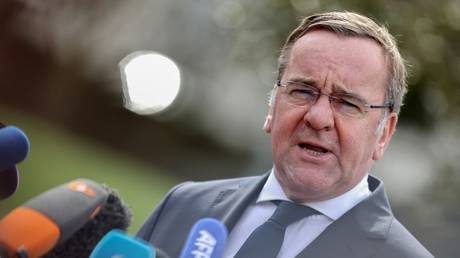 Germany announces €500 million military aid package for Ukraine
Germany announces €500 million military aid package for Ukraine
Moreover, the chancellor continued, “a number of countries, including Ukraine, are currently discussing at the level of security advisers what something that could lead to a peace process might look like.”
However, Scholz stressed that “peace is possible at any time” if Russia were to withdraw troops from the territory Ukraine claims as its own. Moscow maintains it is open to talks with Kiev provided that it recognizes the reality on the ground. However, President Vladimir Zelensky signed a decree banning talks with the current Russian leadership after four former Ukrainian regions overwhelmingly voted to join Russia in the autumn of 2022.
Responding to Scholz’s comments, Kremlin spokesman Dmitry Peskov noted that Russian officials were not present at the aforementioned negotiations at the level of security advisers. He also remarked that the chancellor’s statement “does not change the essence of the ongoing events,” recalling that Germany remains one of Kiev’s most prominent backers.
Peskov pointed out that while various EU countries differ in opinion on how deeply they should be involved in the Ukraine crisis, “this does not change the dominant approach in Europe that Ukraine should be pushed to fight to the last Ukrainian.”
-
Site: RT - News
Global warming is throwing the Earth off balance and making the days longer, a California physicist has warned
The melting of the polar ice caps is shifting the Earth’s weight towards the Equator and slowing down our planet’s rotation, according to a report in the Nature scientific journal. The report warned that this slowdown could wreak havoc on global timekeeping.
Humanity depends on a network of 450 atomic clocks to keep Coordinated Universal Time (UTC). Network computing, global positioning, and financial markets all require this precise measurement of time to function. However, the Earth’s rotation doesn’t always sync up with this official standard: gravitational drag from the sun and moon, changes to the rotational speed of the planet’s core, and earthquakes can all speed up or slow down the passage of time.
The latest threat to UTC comes from melting ice caps in Greenland and Antarctica, geophysicist Duncan Agnew explained in Nature on Wednesday. Using satellite-based gravitational measurements, Agnew and his team at the University of California discovered that melting ice settles as water around the Earth’s midsection, with this change of mass slowing the planet’s rotational speed.
Read more Scientists confirm 2023 hottest year on record
Scientists confirm 2023 hottest year on record
Since UTC was adopted in 1963, a global consortium of scientists have added 27 ‘leap seconds’ to account for the Earth’s slowing rotation. However, the Earth has spun faster in recent years, and the scientists have considered subtracting a second by 2026. According to Agnew’s research, the planet’s slowdown means that this decision will now be unnecessary until 2029.
“If polar ice melting had not recently accelerated, this problem would occur three years earlier,” Agnew wrote. “Global warming is already affecting global timekeeping.”
Regardless of when this second is subtracted, scientists are unsure how the move will affect computer and network systems.
“Different web services currently handle leap seconds differently,” Agnew wrote. “Many systems now have software that can accept an additional second, but few if any allow for removing a second, so that a negative leap second is expected to create many difficulties.”
Aside from its impact on timekeeping, the melting of the ice caps is expected to cause a range of problems and opportunities around the world. According to worst-case estimates by the World Bank, a rise in sea levels by 10-100 centimeters by the year 2100 could submerge the entire Maldives archipelago. On the other hand, melting Arctic ice along Russia’s northern coastline could open up the Northern Sea Route to year-round marine traffic, cutting journey times from China to Europe by nearly half and placing Moscow in control of a lucrative shipping lane.
-
Site: RT - News
Washington’s “adversarial relationship” with Russia prevented full disclosure of what it knew, sources told the newspaper
A lack of trust between the US and Russia prevented Washington from sharing all the intelligence it possessed about a looming terrorist attack in Moscow, the New York Times has claimed.
Four gunmen staged one of the bloodiest massacres in Russian history last Friday, when they went on a gun rampage at a large concert venue just outside of the capital before setting the building on fire. Over 140 people were killed in the attack.
Earlier in March, the US embassy in Moscow issued a warning to American citizens about a possible attack. Separately, a non-public message was sent to Russian security officials. Aleksandr Bortnikov, the head of Russia’s Federal Security Service (FSB), described it as “general in nature,” while updating the public on the investigation on Tuesday.
“The adversarial relationship between Washington and Moscow prevented US officials from sharing any information about the plot beyond what was necessary,” the Times said. The Americans purportedly held back information “out of fear Russian authorities might learn their intelligence sources or methods,” it said.
Read more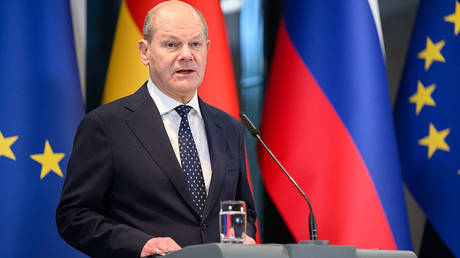 Germany had no prior knowledge of Moscow terror attack – Scholz
Germany had no prior knowledge of Moscow terror attack – Scholz
In the public warning on March 7, the embassy said the threat was acute for the next 48 hours. The newspaper said it was “unclear whether US intelligence mistook the timing of the attack or the extremists delayed their plan upon seeing heightened security.”
President Vladimir Putin described the perpetrators as radical Islamists, after they were apprehended in a Russian region bordering Ukraine. They had allegedly been recruited through an online chat operated on behalf of ISIS-K, an Afghanistan-based offshoot of the once-powerful terrorist organization Islamic State (IS, formerly ISIS).
Washington has also pinned the mass murder on ISIS-K, which has claimed credit for it. However, Russian officials have argued that some other party, such as Ukrainian intelligence services, may have masterminded the plot.
Some Russian news outlets have suggested that the terrorists had initially planned an earlier assault at Crocus City Hall. On March 10, the venue hosted a concert by performer Shaman, who is labeled “pro-Putin” by critics of the Russian leader due to the nationalist lyrics in some of his songs.
READ MORE: The US has sacrificed a common anti-terror principle to stick it to Putin
One of the perpetrators was apparently photographed at the premises on March 7, according to an image published in the Russian media. Security was reportedly heightened at the concert hall in the days following the American warning.
-
Site: RT - News
Allowing bad news to occasionally slip through would be better than fostering a climate of total control, a senior diplomat has said
The Ukrainian government should be more open with the public about communicating hard truths about the battlefield situation, a senior US State Department official has said.
In an interview with Politico on Thursday, James Rubin, who leads the Global Engagement Center, a US agency tasked with exposing and countering disinformation, noted that while Ukraine is “moving in the right direction,” it is not yet “a fully-fledged democracy,” which implies certain constraints for media in the country.
In light of this, officials in Kiev “may [sometimes] resist the kind of freedom of information that’s normal for us,” he said.
The diplomat urged the Ukrainian government to be less restrictive when overseeing the media coverage of the hostilities. “Some days, war reporters report things that aren’t necessarily in the interest of [Ukrainian President] Vladimir Zelensky,” he said, adding that given Kiev’s democratic aspirations, occasional bad news is preferable to living in an overly controlled environment.
Read more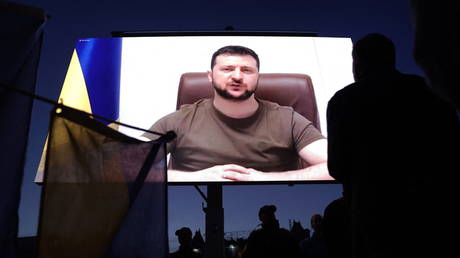 Ukrainians tired of ‘state propaganda’ on TV – NYT
Ukrainians tired of ‘state propaganda’ on TV – NYT
Ukraine embarked on a censorship crusade against Russian-dominated internet resources several years before the start of the current conflict, banning the social media network Vkontakte and search engine Yandex among others as early as 2017.
After the outbreak of the conflict in February 2022, Ukraine broadly intensified censorship and propaganda. In late 2022, Zelensky signed a law that significantly expanded the government’s authority to regulate media, outlawing positive coverage of Russia’s actions and allowing for outlets to be temporarily banned.
The new legislation sparked fierce criticism both in Ukraine itself and in the West. The European Federation of Journalists said it contradicted standards of press freedom common on the continent.
In June 2023, the Intercept reported that Kiev had imposed extremely tight restrictions on reporter access to the front line, denying or revoking press credentials from both foreign and Ukrainian journalists over their coverage.
Last month, the New York Times also reported that many Ukrainians had grown tired of the telemarathon established by Zelensky shortly after the start of the conflict, which runs around the clock on national television. The paper described the program, which provides a relentlessly optimistic take on battlefield developments, as “little more than a mouthpiece for the government.”
-
Site: RT - News
Unlike the EU, the US is willing to buy Turkish explosives to arm Ukraine, the outlet has reported
The US is planning to increase purchases of military-grade explosives from Türkiye to ramp up production of artillery shells, after its stockpiles were drained by the Ukraine conflict, Bloomberg reported on Wednesday.
Western nations are struggling to supply enough munitions to Kiev to sustain its fight against Russia. A global surge in demand for weapons components has undermined efforts by the US and its allies to produce more artillery shells for Ukraine.
The US is already relying on Türkiye to replenish munitions stockpiles and intends to purchase Turkish-made propellants trinitrotoluene and nitroguanidine to deliver on its plans for domestic defense manufacturing, Bloomberg said citing anonymous officials.
The outlet contrasted the US approach to that of the EU. Members of the European bloc have “held back from using funds for purchases from Türkiye because of resistance from France, Greece and Cyprus,” the report noted. The policy did not change even as member states were lagging behind on their promise to deliver one million 155mm shells to Ukraine by March.
Read more Erdogan considering military operations in Iraq and Syria
Erdogan considering military operations in Iraq and Syria
The US has had its own points of contention with Ankara, including over its purchase of Russian long-range air defense systems, which prompted then US President Donald Trump to kick the country out of the F-35 fighter jet program.
The partnership over artillery shells “would build” on a recent thaw in the relationship, according to Bloomberg. After Ankara cleared Sweden to join NATO, Washington in January authorized the long-awaited purchase of F-16 fighter jets and upgrade kits by Türkiye. A last-ditch bid to stop the $23 billion deal in the US Congress, where Senator Rand Paul argued that it would embolden Turkish “misbehavior,” was defeated in late February.
Victoria Nuland, the outgoing senior US diplomat who has held the Ukraine portfolio at the State Department for years, told CNN Türk in January that Washington would be “delighted to welcome Türkiye back into the F-35 family,” provided that the issue of Russian weapon systems is “resolved.”
READ MORE: Ukraine’s army in ‘stagnation’ – Zelensky’s top adviser
Moscow considers the Ukraine conflict to be a US-led proxy war against Russia. It has also said that donations of Western weapons will only prolong hostilities without changing the outcome. In contrast to EU states, Türkiye has refused to cut economic ties with Russia.
-
Site: RT - News
Alisher Usmanov has taken legal action over unlawful raids on his properties in the country
German authorities have launched a criminal probe targeting two investigators in Frankfurt after Russian businessman Alisher Usmanov filed a complaint over violation of his rights, Bild reported on Wednesday, citing the general prosecutor’s office.
A criminal case was initiated against two public prosecutors on the basis of pleas lodged by two people, according to the office’s spokesman, Dominique Mies, who said that one of the complainants is a “70-year-old businessman from the Russian Federation.”
Usmanov’s representative confirmed his filing the complaint, but refused to provide further comments “while legal proceedings are ongoing,” Russian business daily RBK reported.
The case was launched on suspicion of non-cooperation with public justice and prosecution of the innocent, Bild wrote, adding that Usmanov’s appeal is linked to raids on his properties in Germany carried out in 2022 and declared illegal by a regional court in Frankfurt last May.
The Frankfurt court previously ruled that searches conducted in the city of Rottach-Eggern, on a yacht in Hamburg, and at the apartment of Usmanov’s friends were illegal, pointing to “serious deficiencies” in the warrants requested by Frankfurt’s Public Prosecutor’s Office at the time.
Read more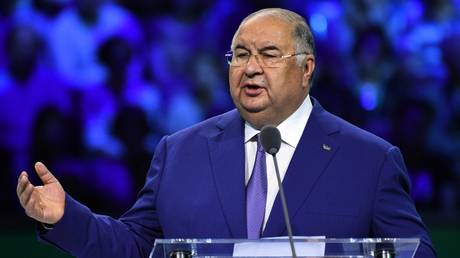 EU court dismisses Russian tycoon’s sanctions appeal
EU court dismisses Russian tycoon’s sanctions appeal
The court also invalidated a search at the offices of the businessman’s lawyers in Munich. Commenting on the ruling, Usmanov’s representative said that it confirmed the “baselessness of accusations” against him.
The Uzbek-born businessman holds a major stake in USM, a Russian investment group with holdings in Metalloinvest, one of the world’s largest iron ore producers, and telecommunications company MegaFon. Usmanov, whose net worth totals $14.4 billion according to Forbes, was added to the US, UK, and EU sanctions lists in 2022. Authorities froze some of the billionaire’s assets.
Brussels explained its blacklisting of Usmanov by saying he has “particularly close ties” with Russian authorities and actively supports Moscow’s policies in relation to Ukraine.
The tycoon lodged an objection with the European Court of Justice, but his appeal was dismissed. German investigators suspect Usmanov of money laundering and tax evasion. The businessman has denied the allegations.
For more stories on economy & finance visit RT's business section
-
Site: RT - News
A large number of people fear new assaults in the wake of the mass shooting in Russia, a poll has suggested
French citizens strongly fear that the country could be hit by a terrorist attack in the coming weeks or months, a poll published on Thursday has shown.
The survey, conducted after a terrorist attack on a packed music venue outside Moscow last week, and a few months before the Paris 2024 Olympic Games, has revealed significant concern over a potential assault, with an average score of 7 out of 10 points on the fear scale among those interviewed. The 0 mark indicates ‘very low fear’ of a terrorist attack, while 10 corresponds to ‘very high fear’.
The survey was carried out by the CSA institute for CNews, Europe 1, and Le Journal du Dimanche on March 26 and 27 among 1,013 people aged 18 and over. It showed a notable gap in the level of vigilance between men and women. The data showed that women are more concerned about a potential terrorist attack threat, giving an average score of 7.3 compared to 6.7 displayed by men.
Analysis by age group revealed that French youth, particularly those under the age of 35, are the most affected by anxiety on the issue. People aged 35 to 49 seem to be less concerned, while fear increases slightly among adults over 50.
READ MORE: France raises terrorism threat level
According to the researchers, the numbers could reflect a variety of factors, including differences in public engagement, exposure to media sources, and sensitivity to public policies.
Reinforced security measures have been in place in France since a wave of terrorist attacks in January 2015, when a group of Islamists killed 17 people in Paris and its suburbs. In November of that year, France saw one of the deadliest Islamist attacks in its history, when suicide bombers and gunmen hit a concert hall, a major stadium, restaurants, and bars in Paris, killing 130 people.
Following the terrorist attack in Russia on Friday, which left 143 people dead, France raised the terrorism alert level across the country to its highest level.

